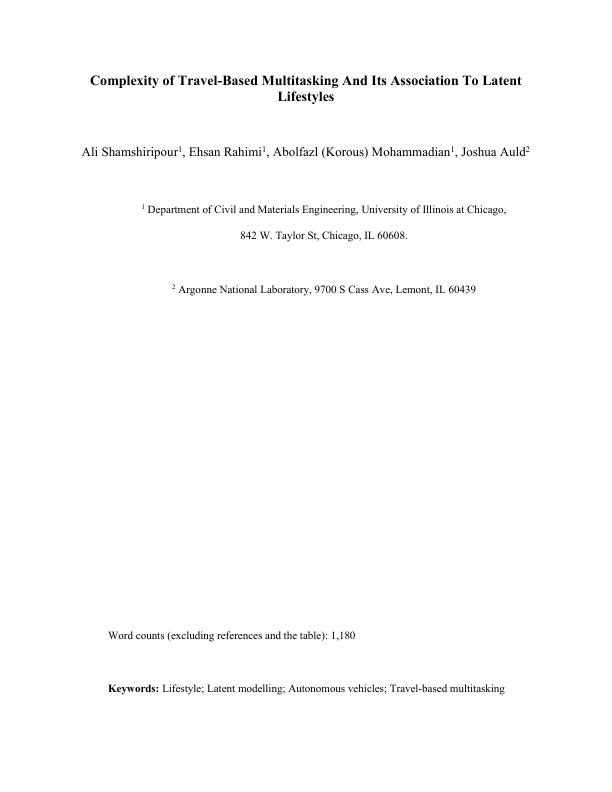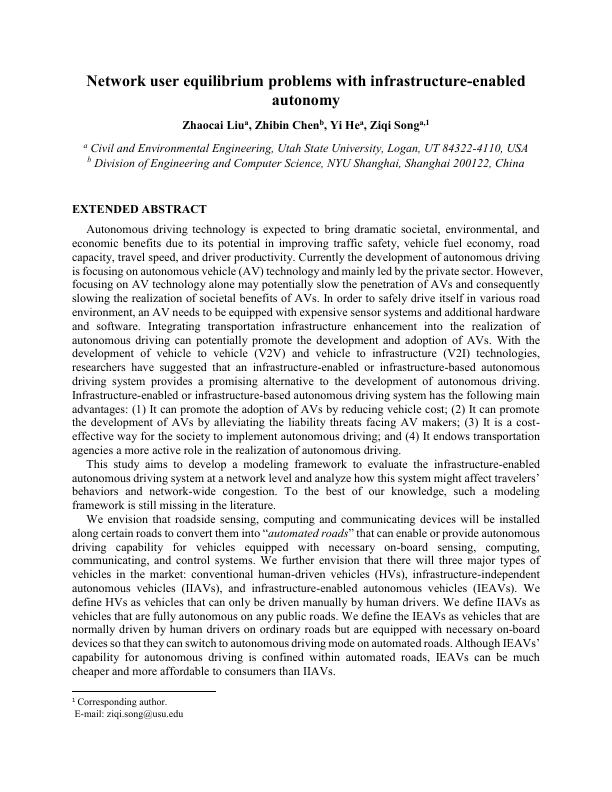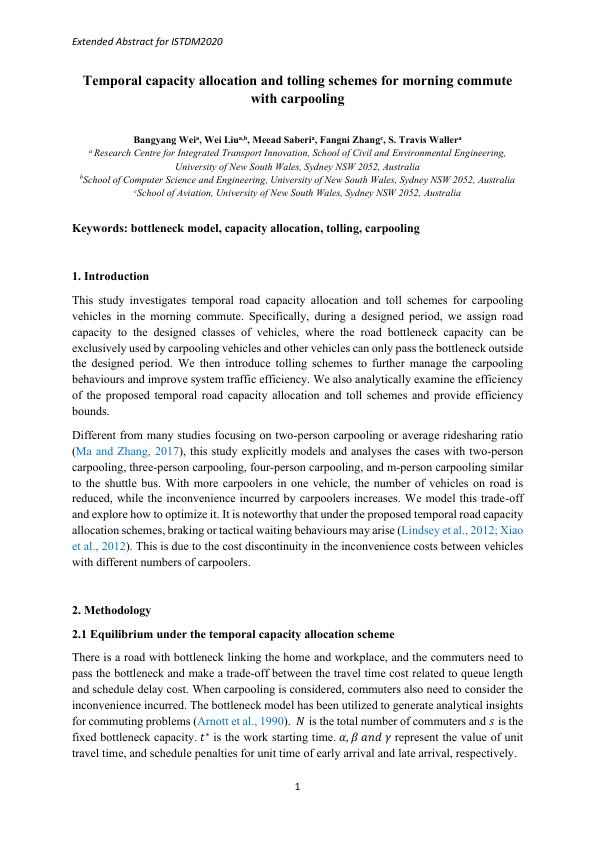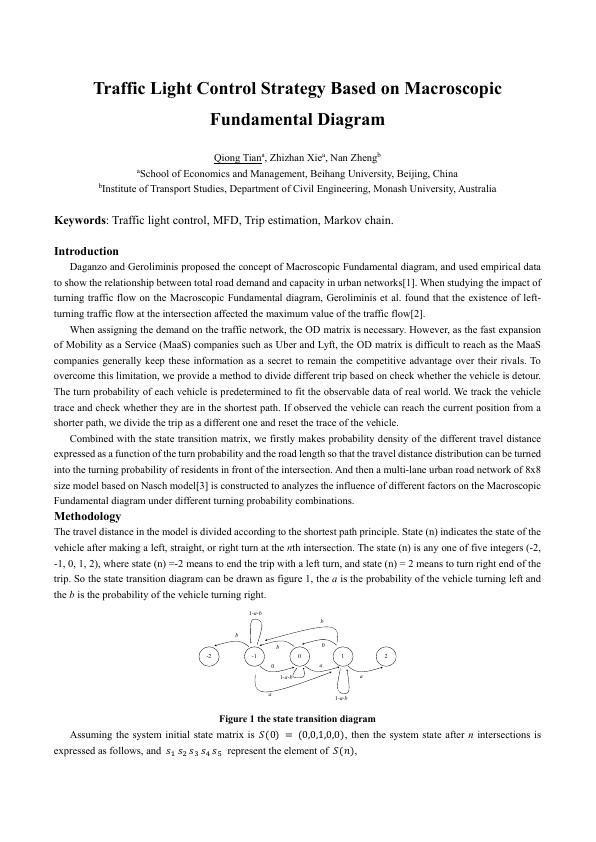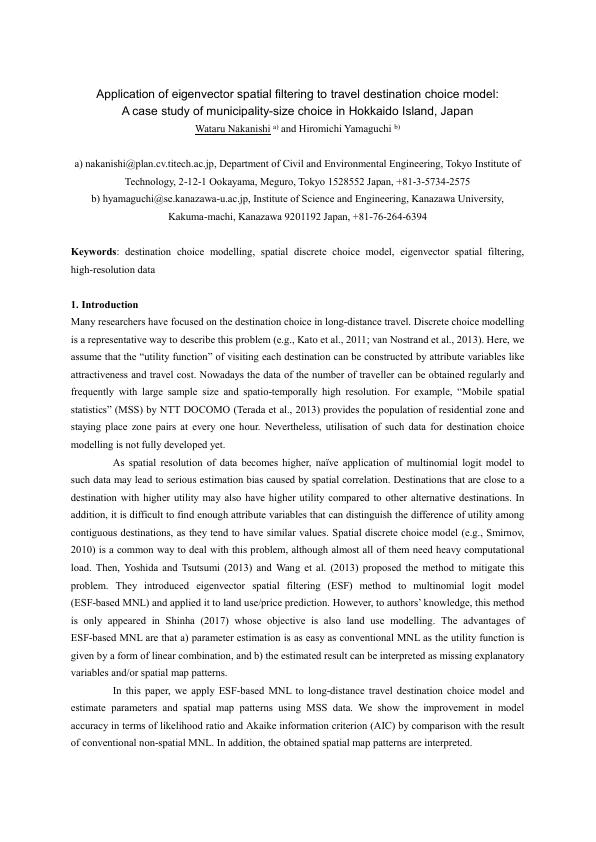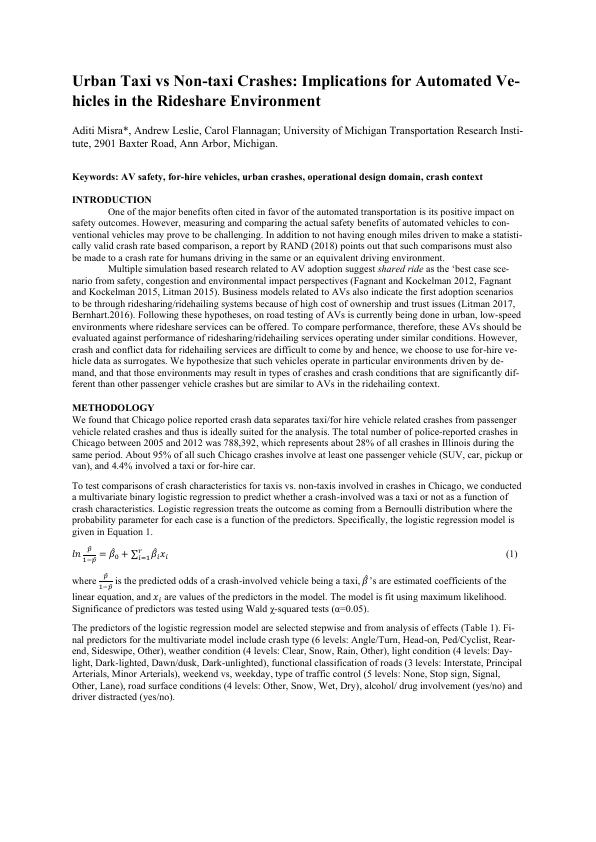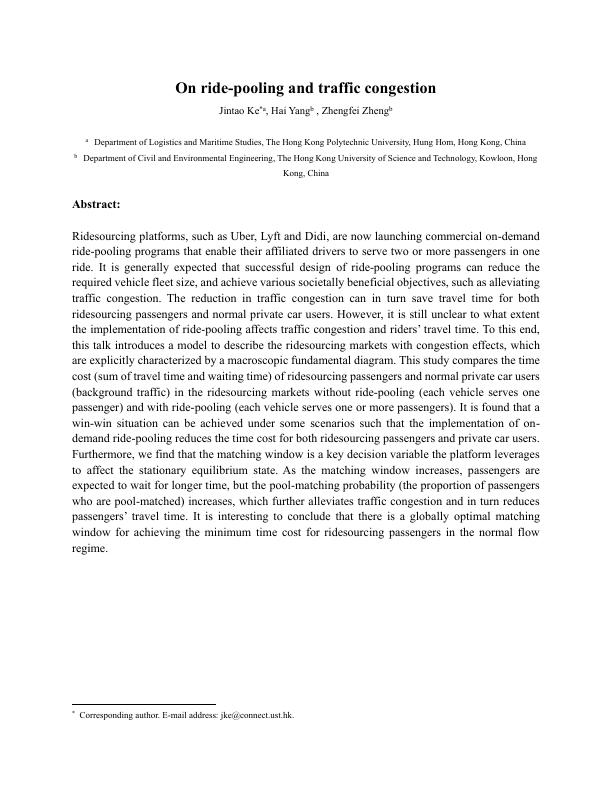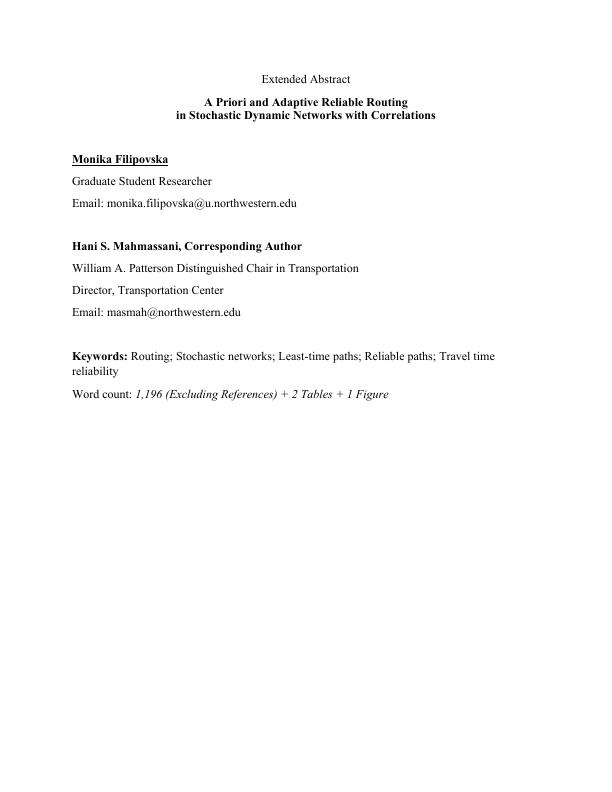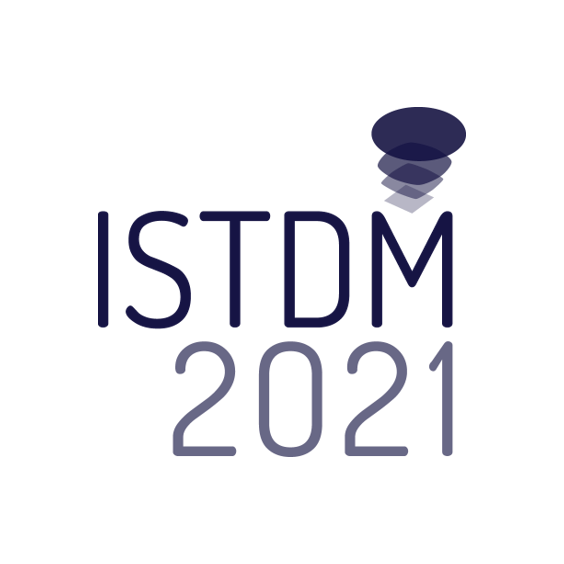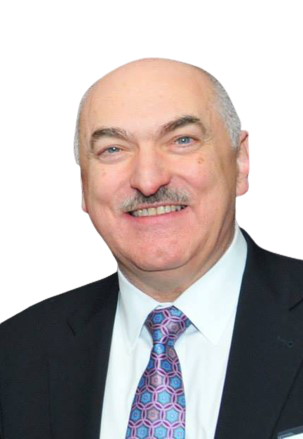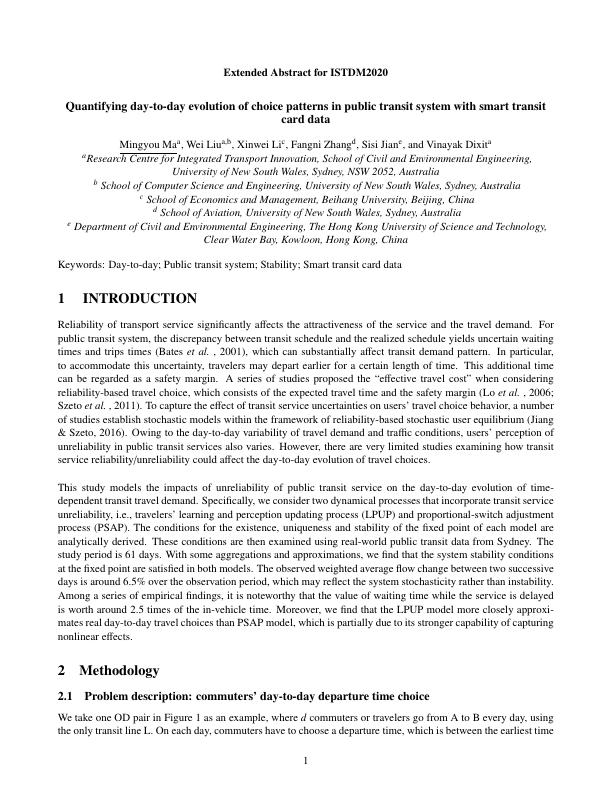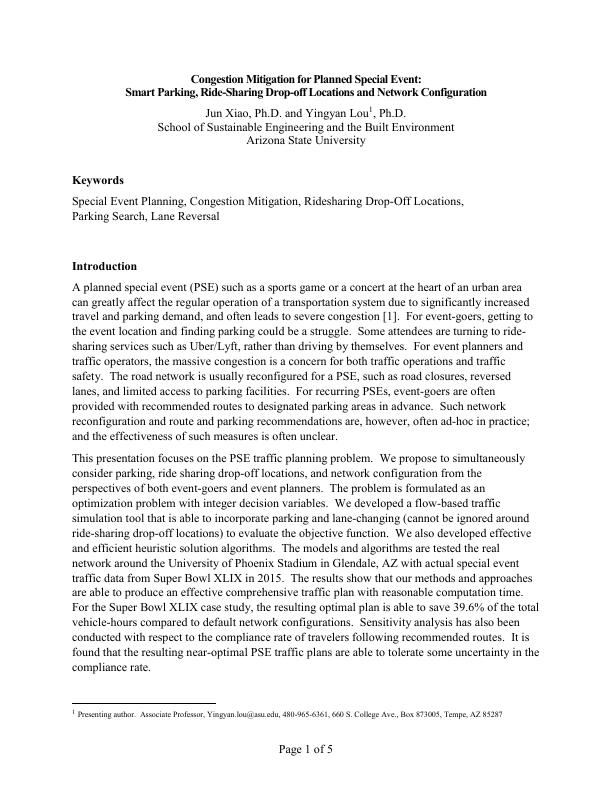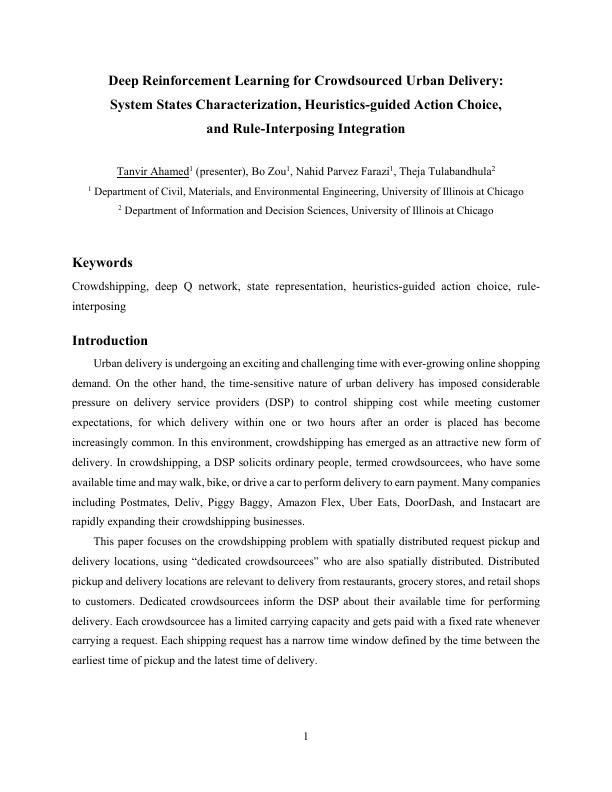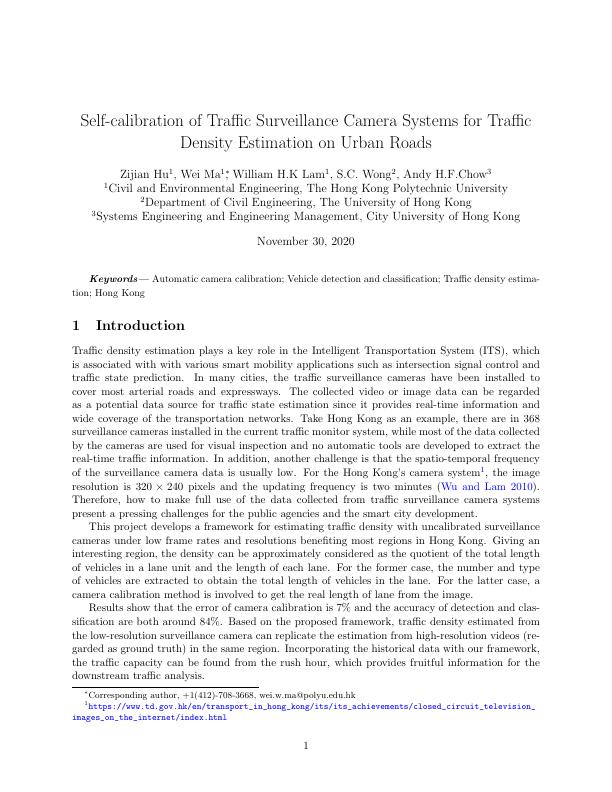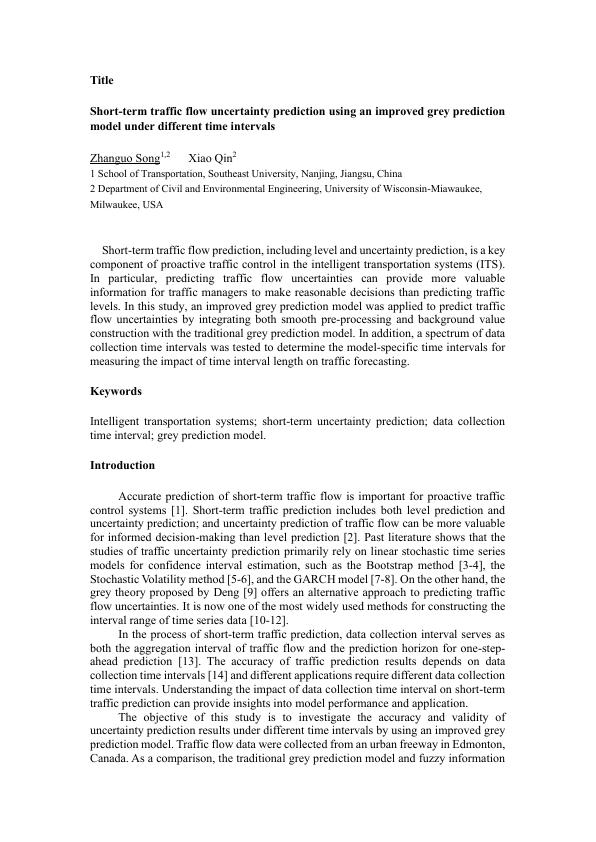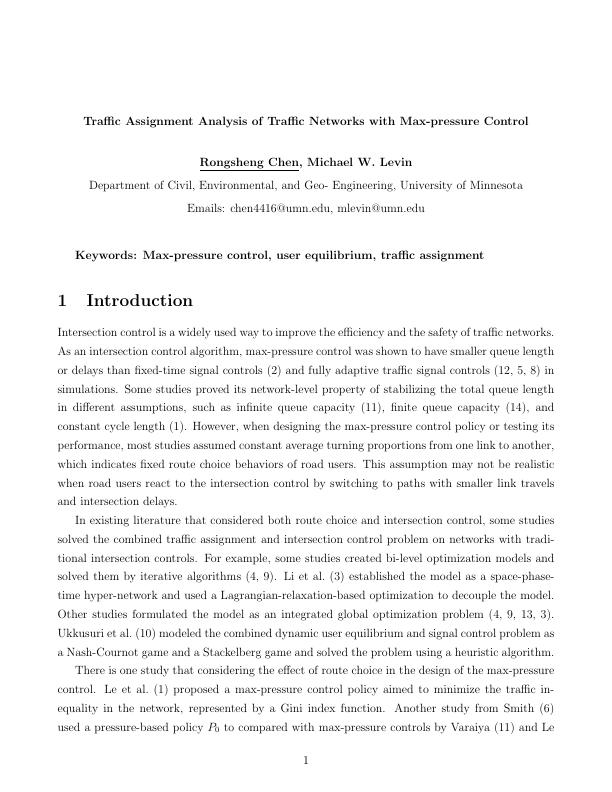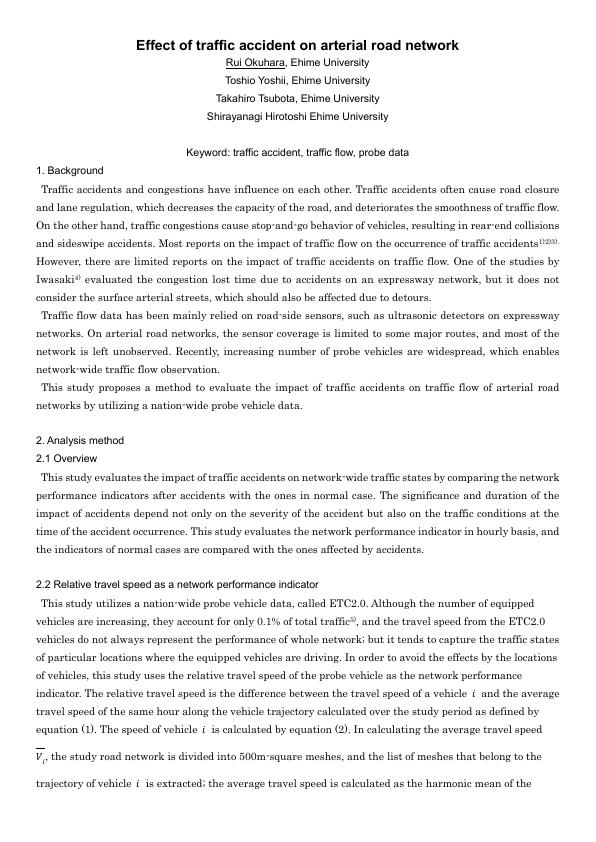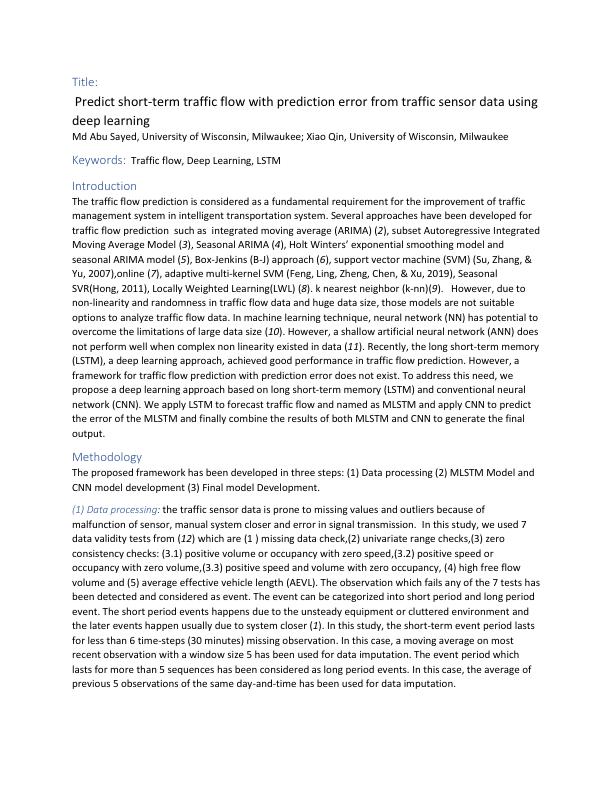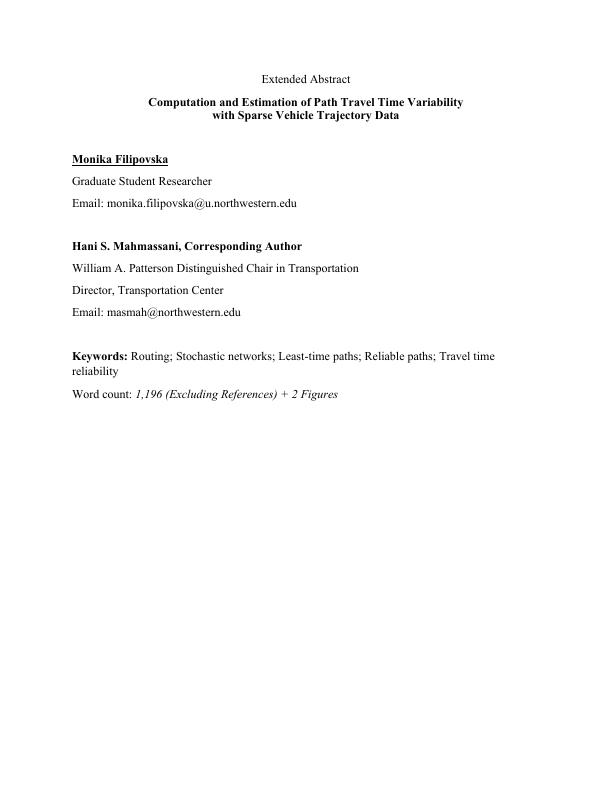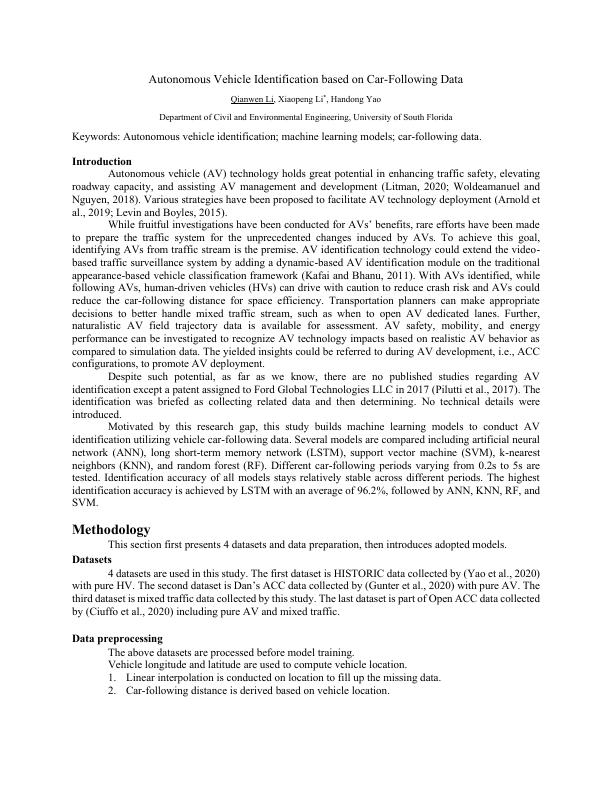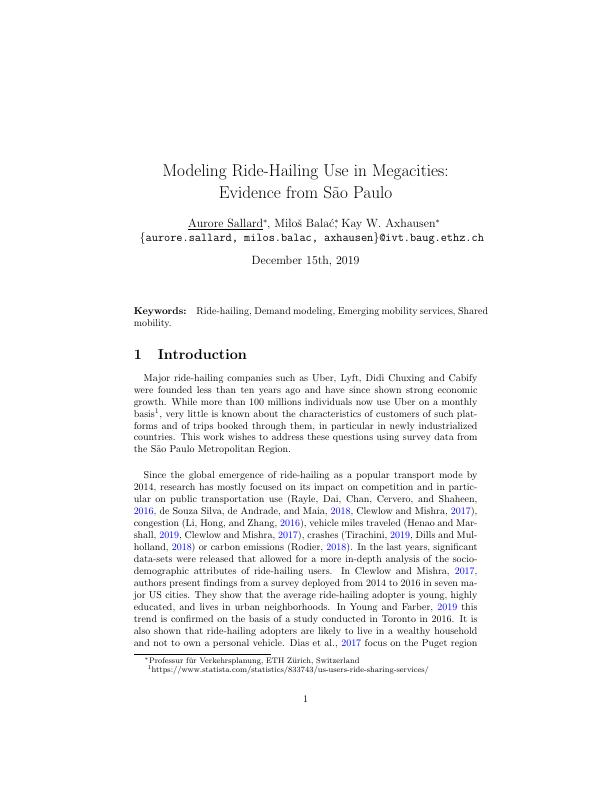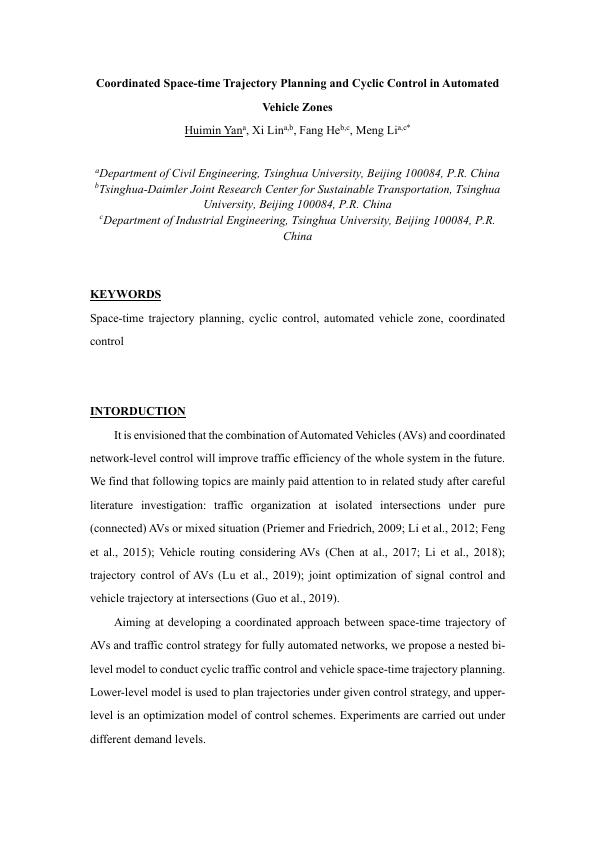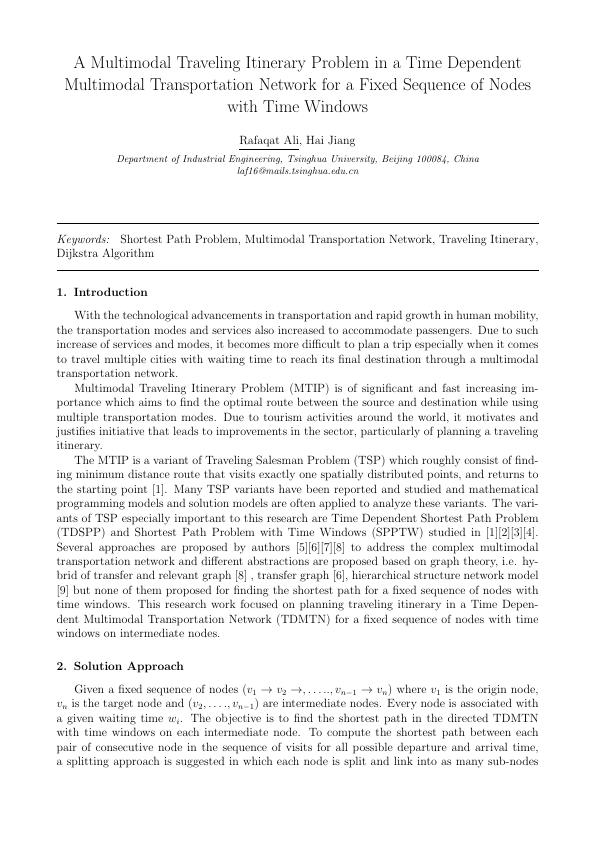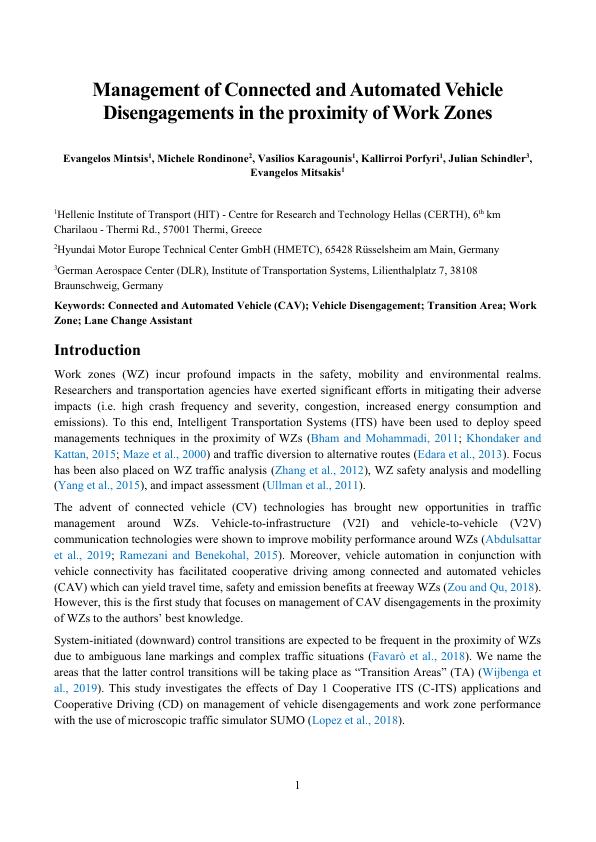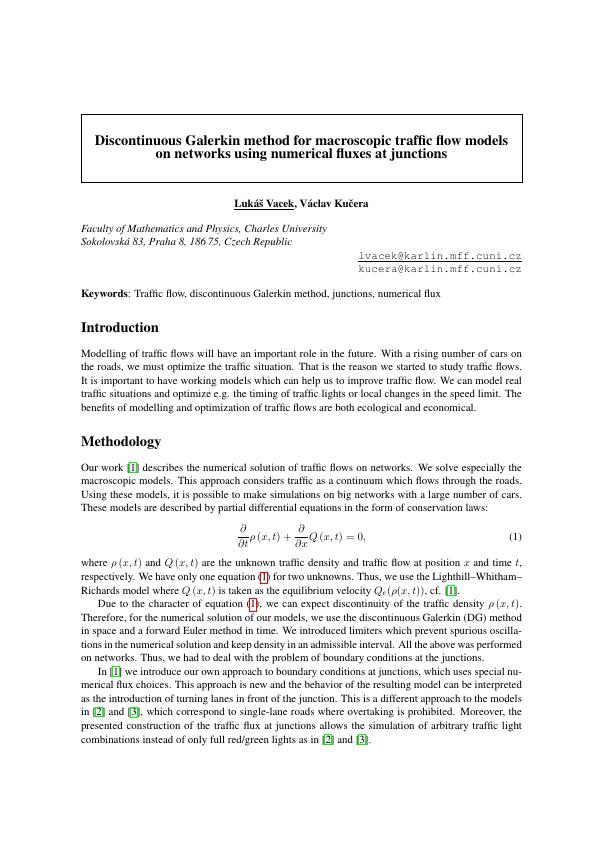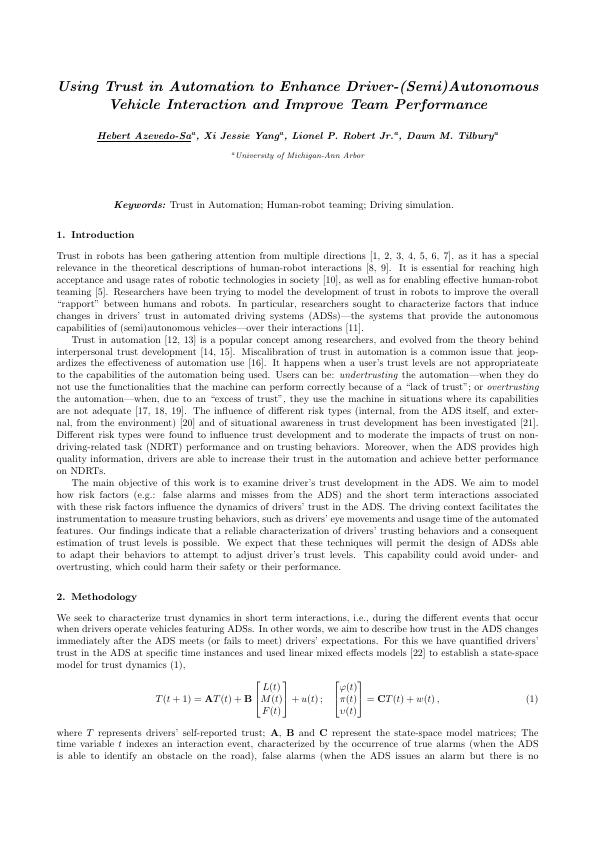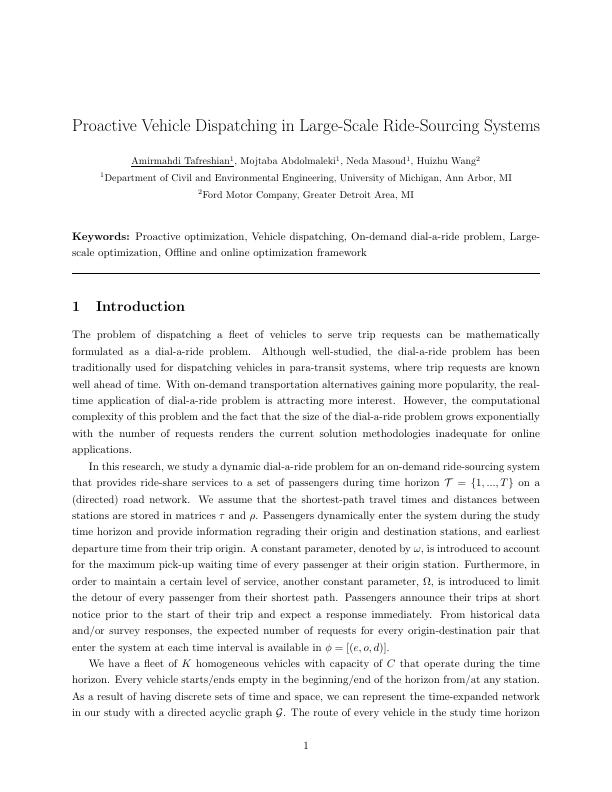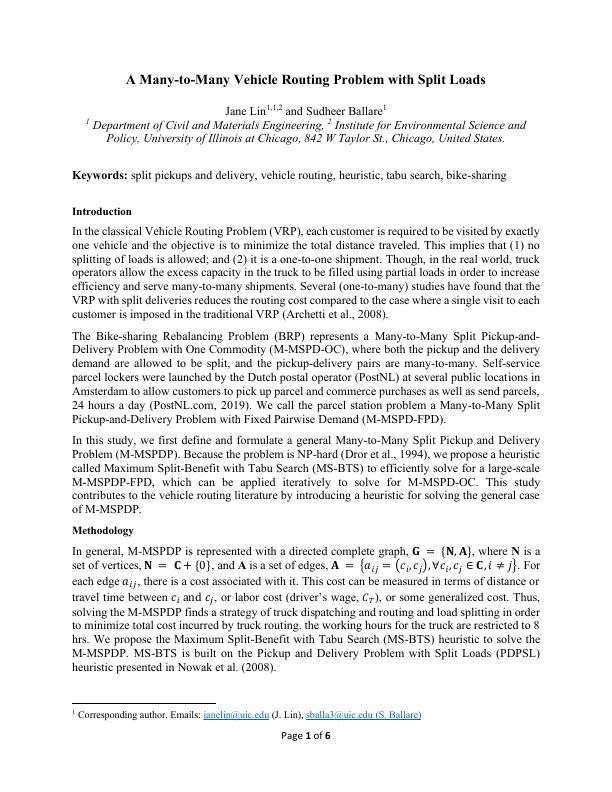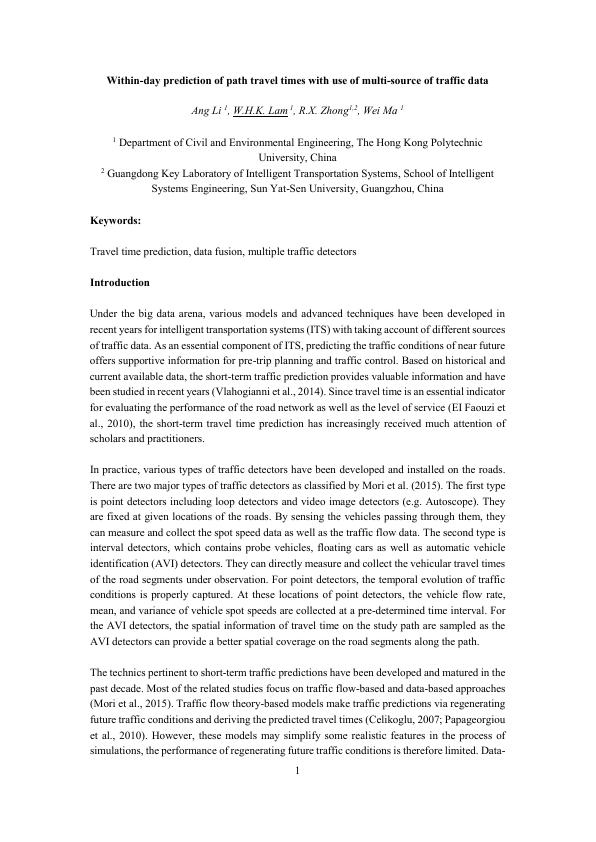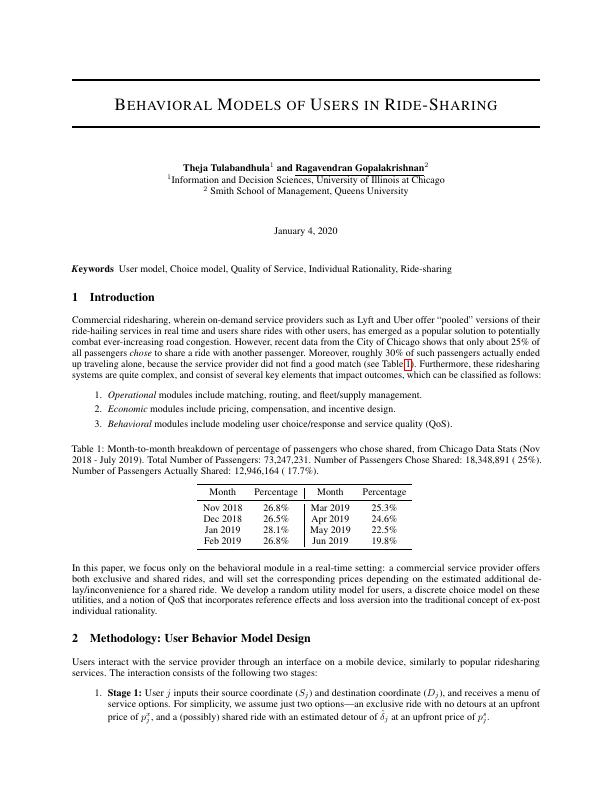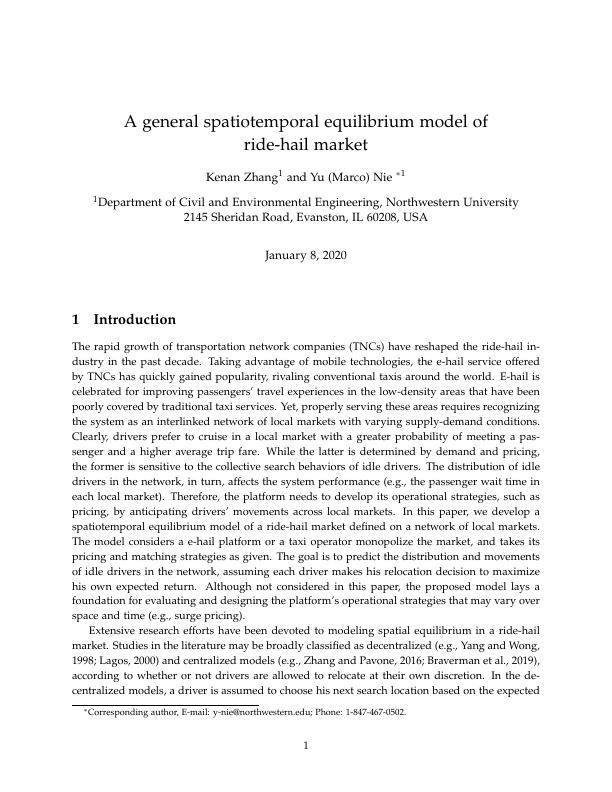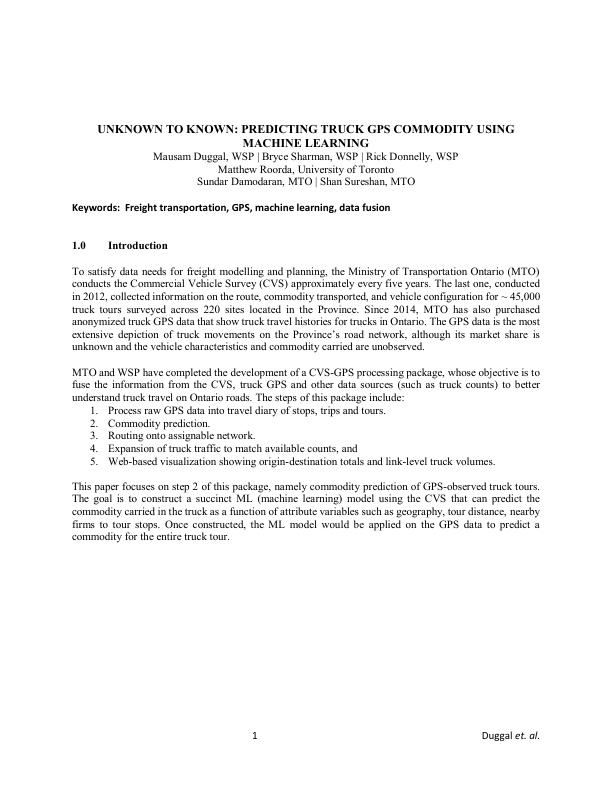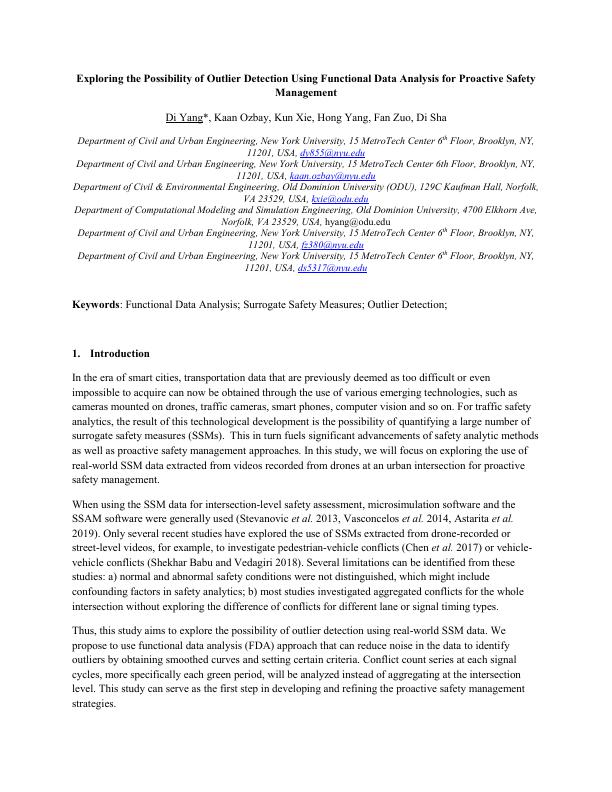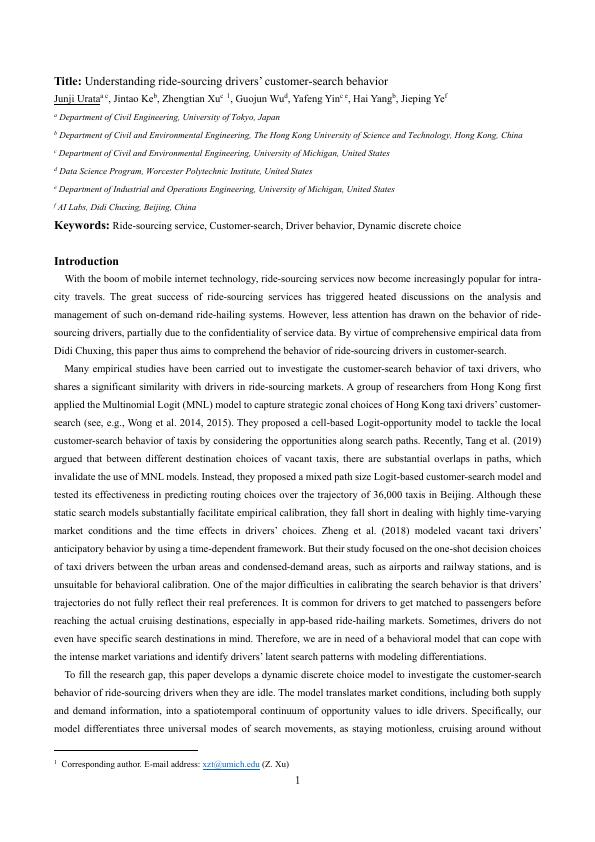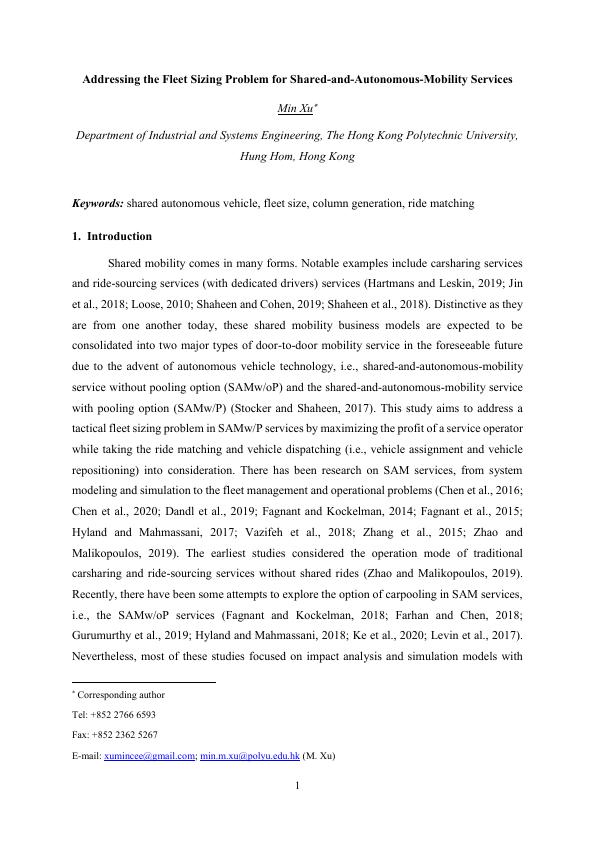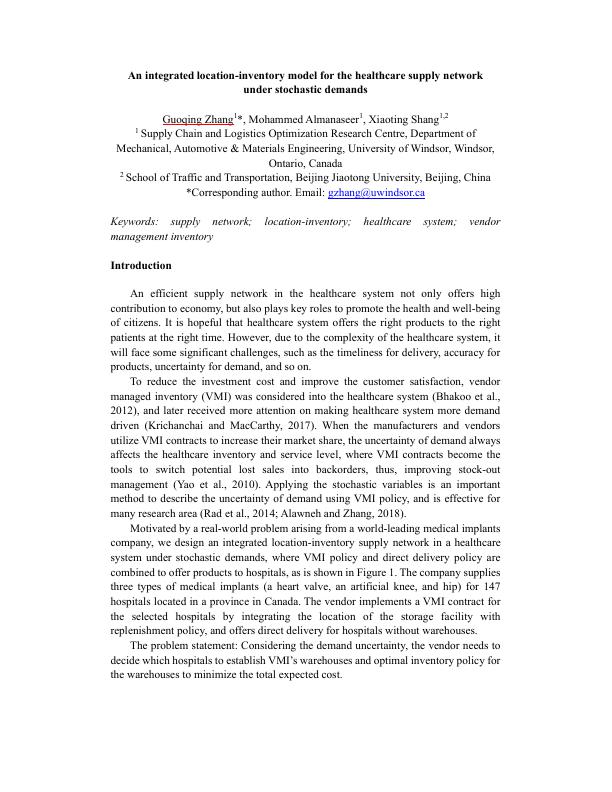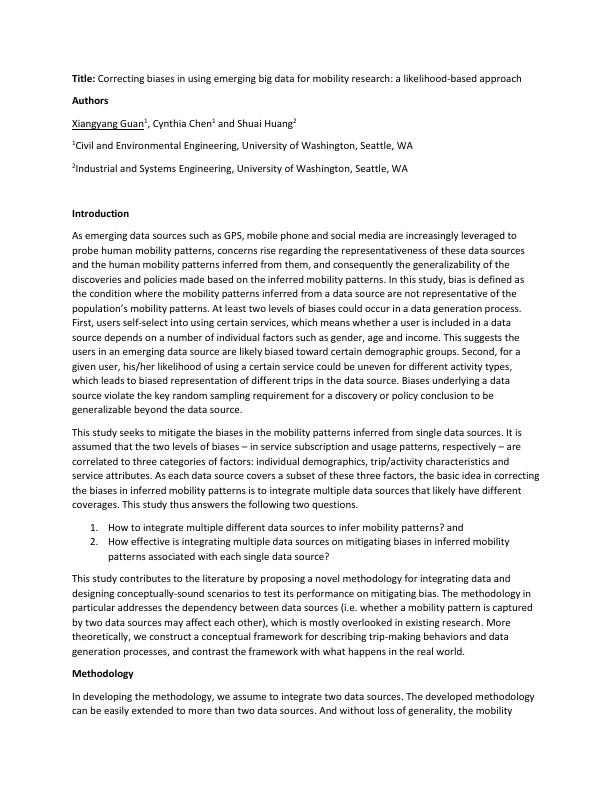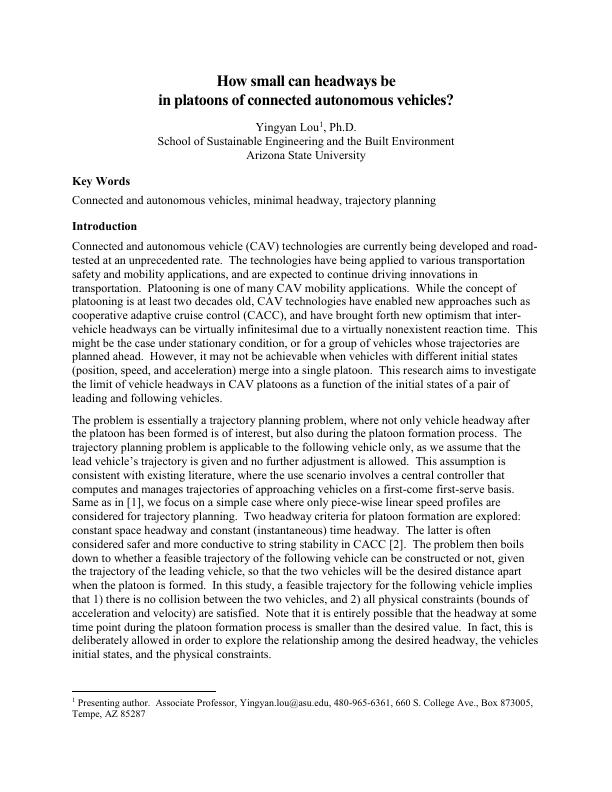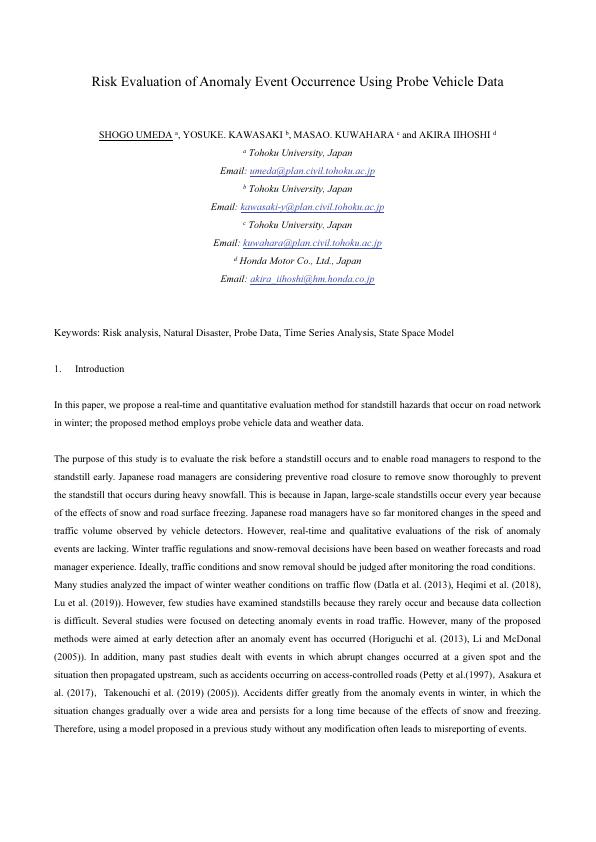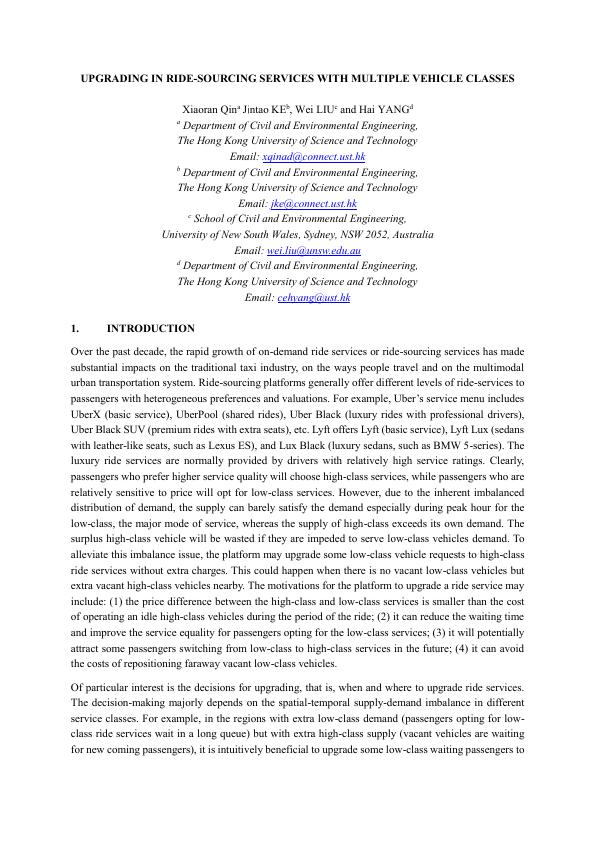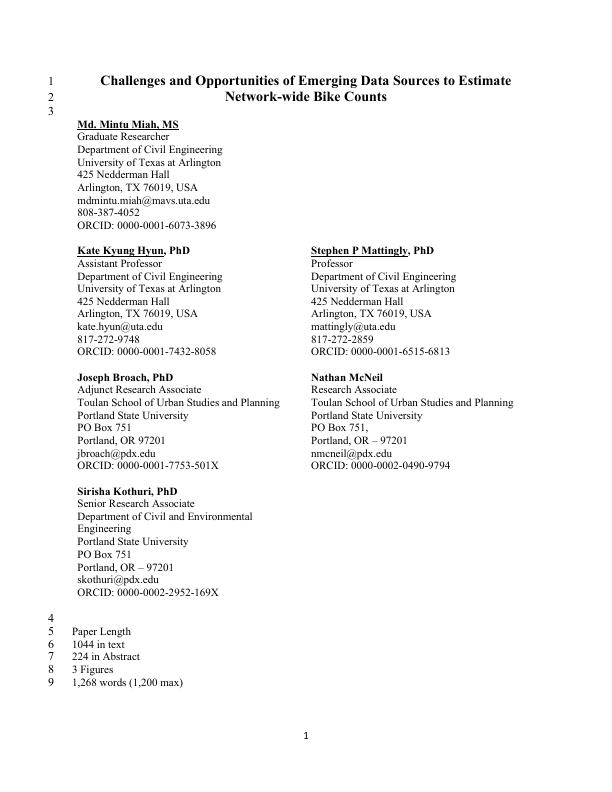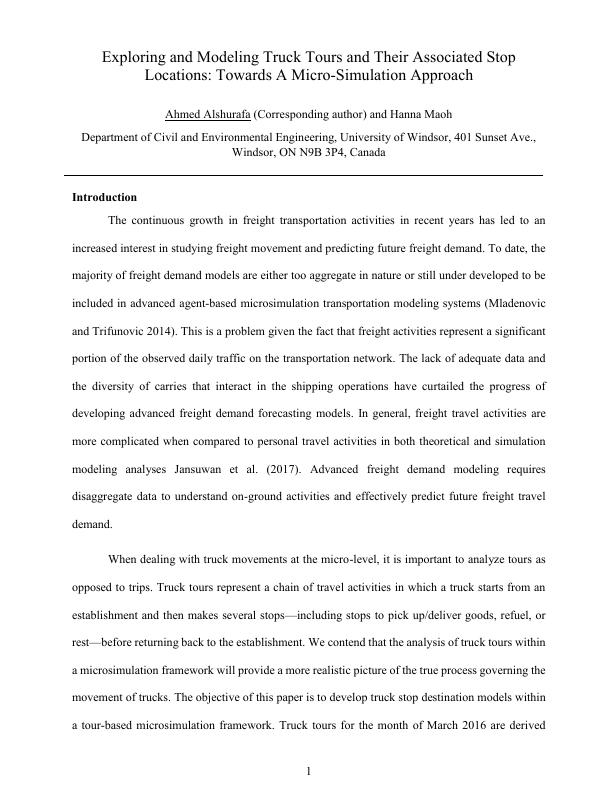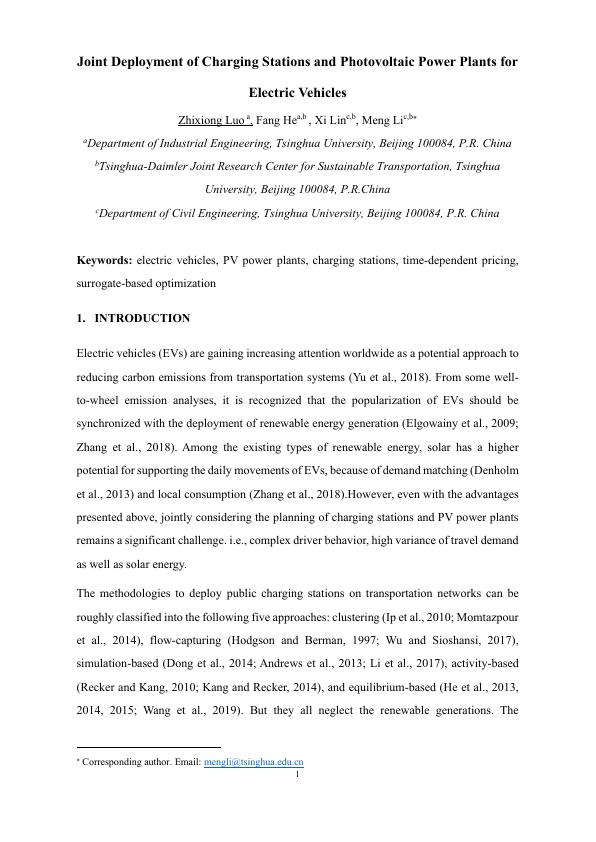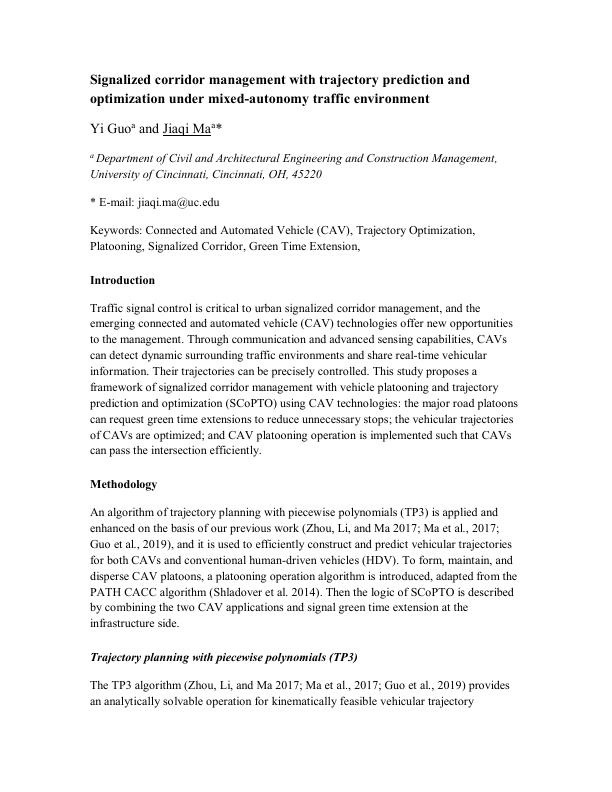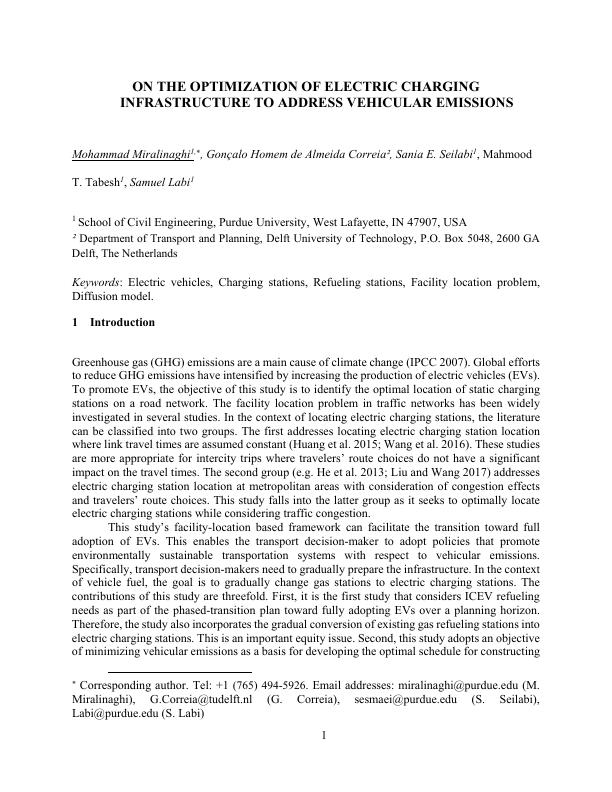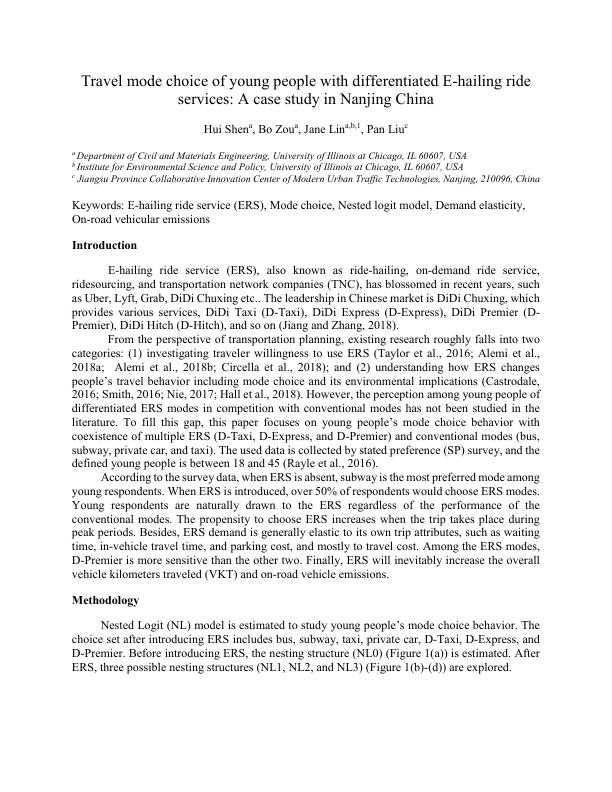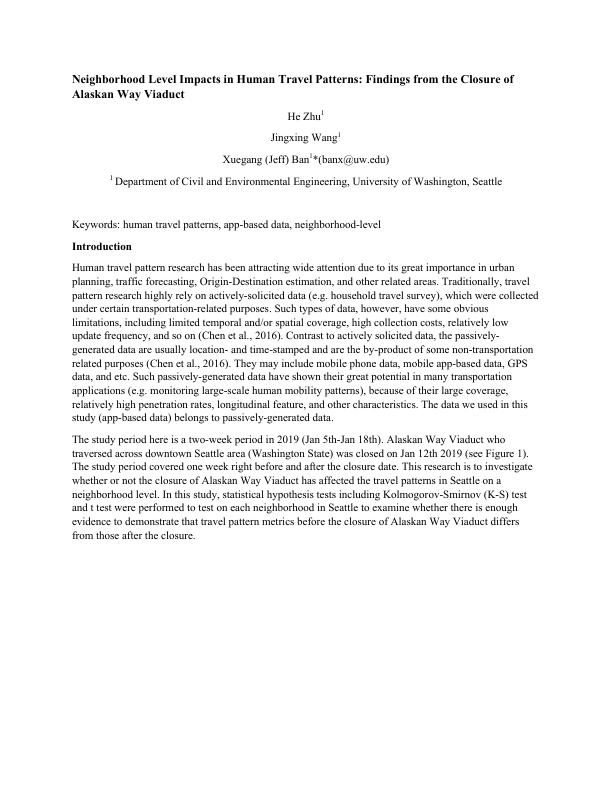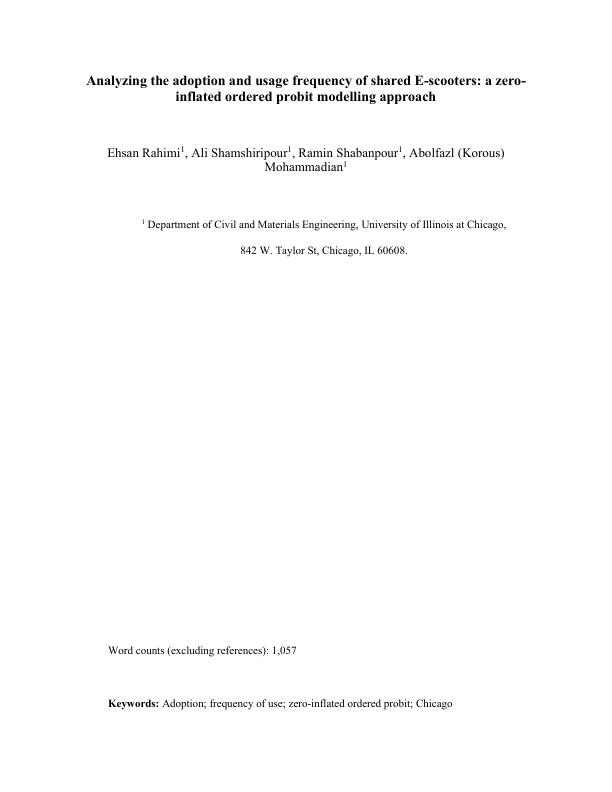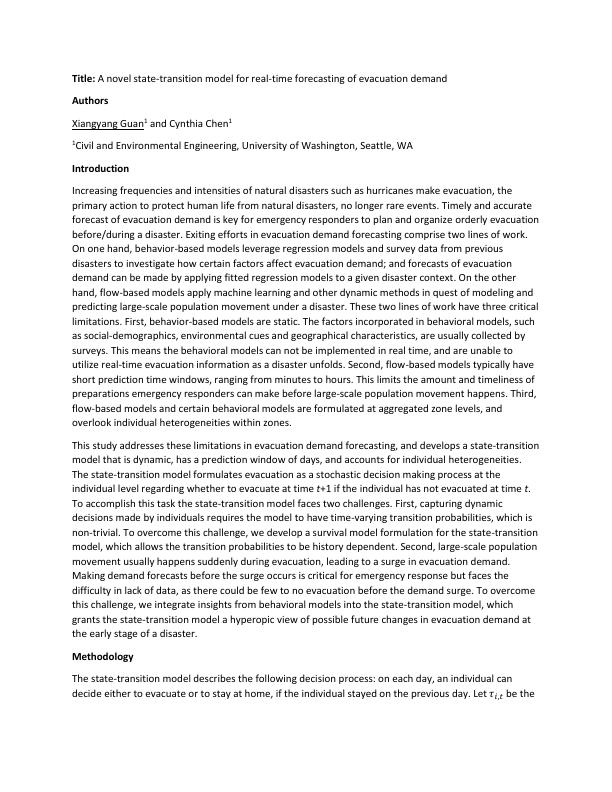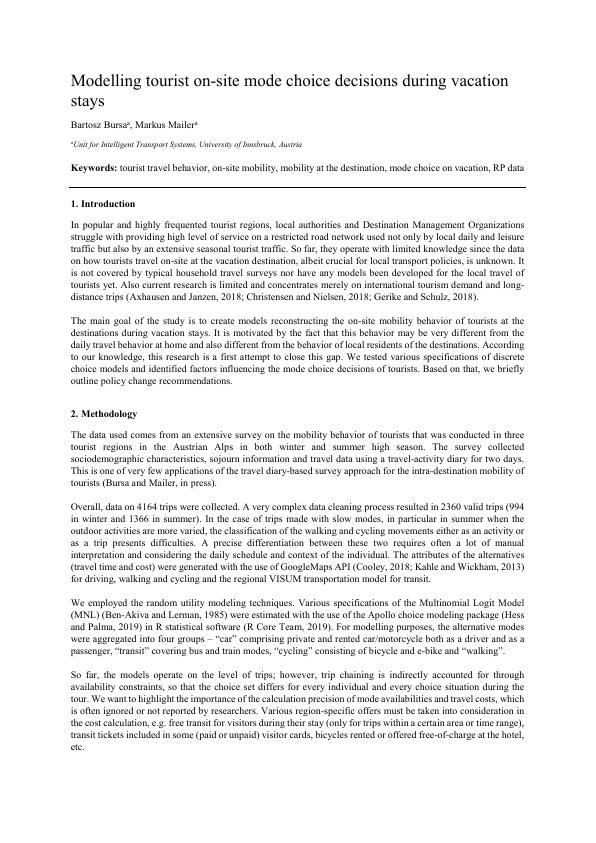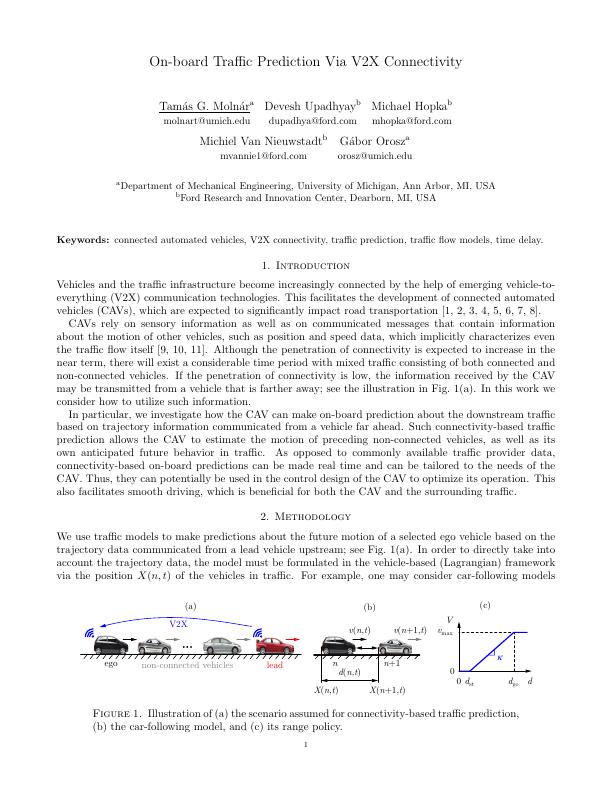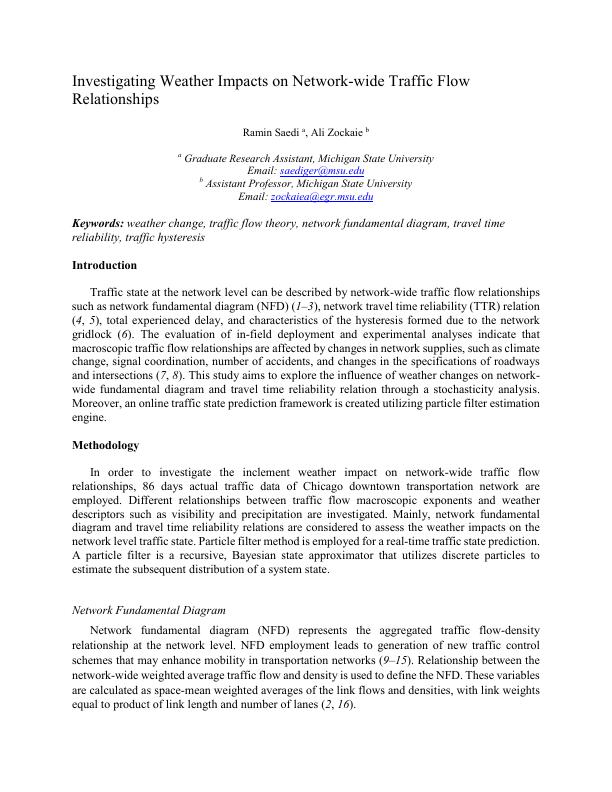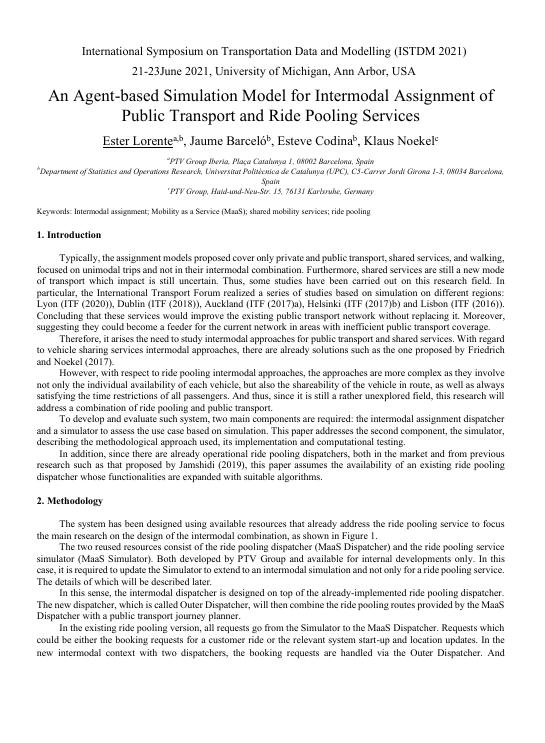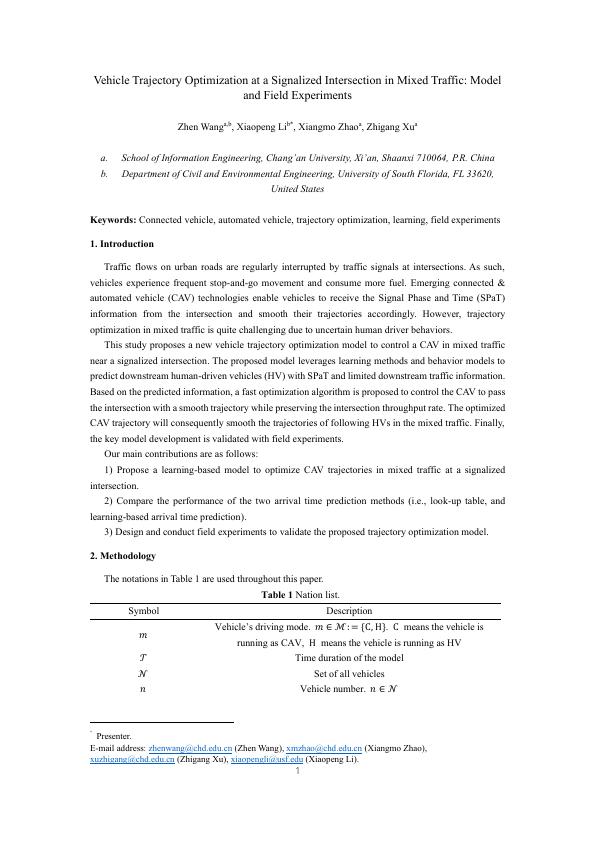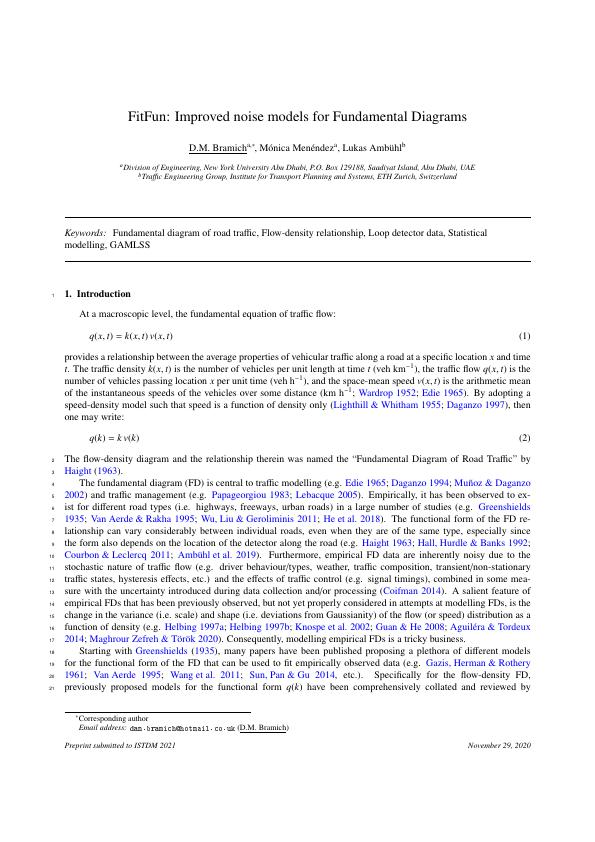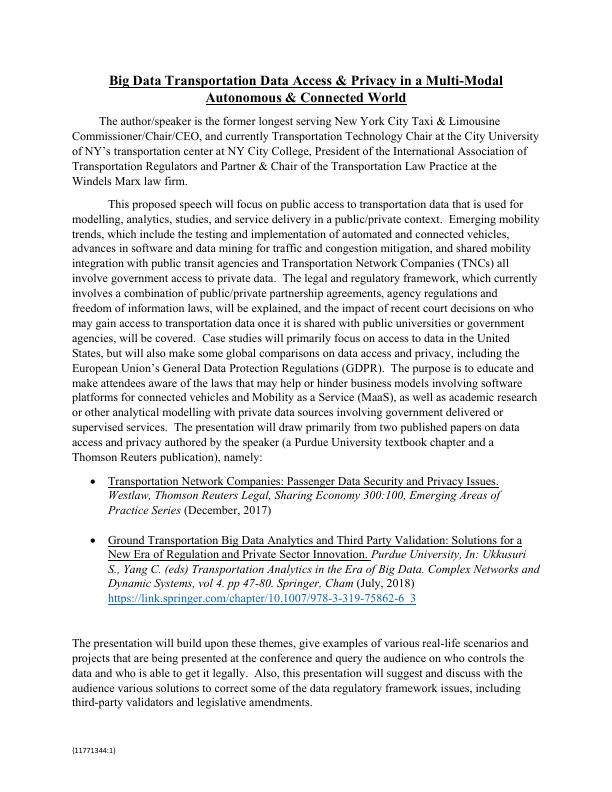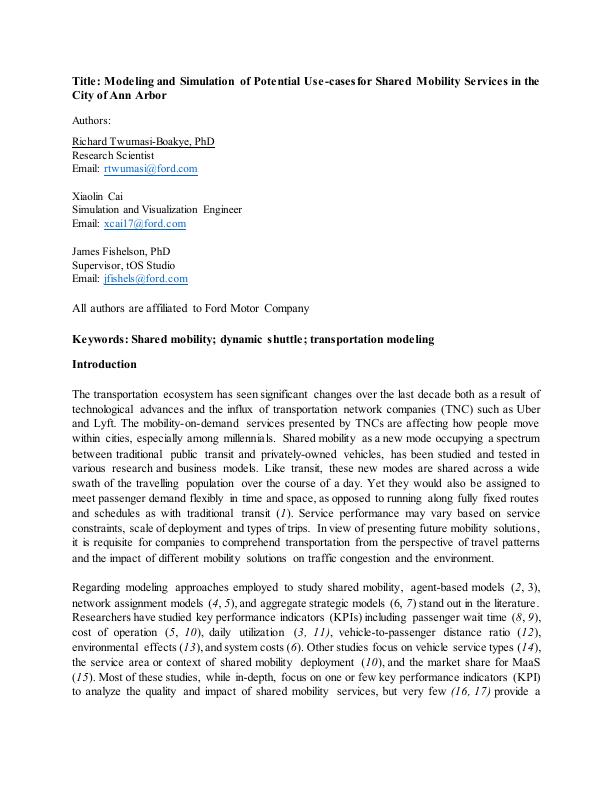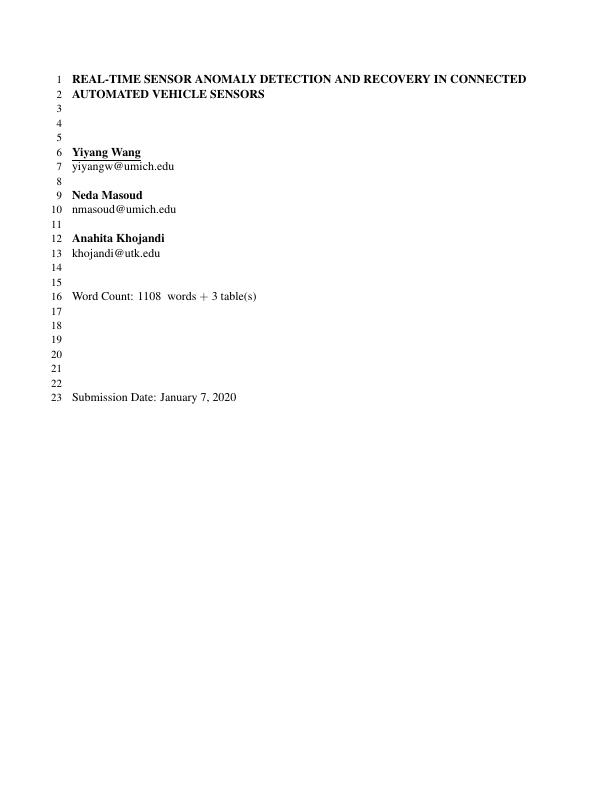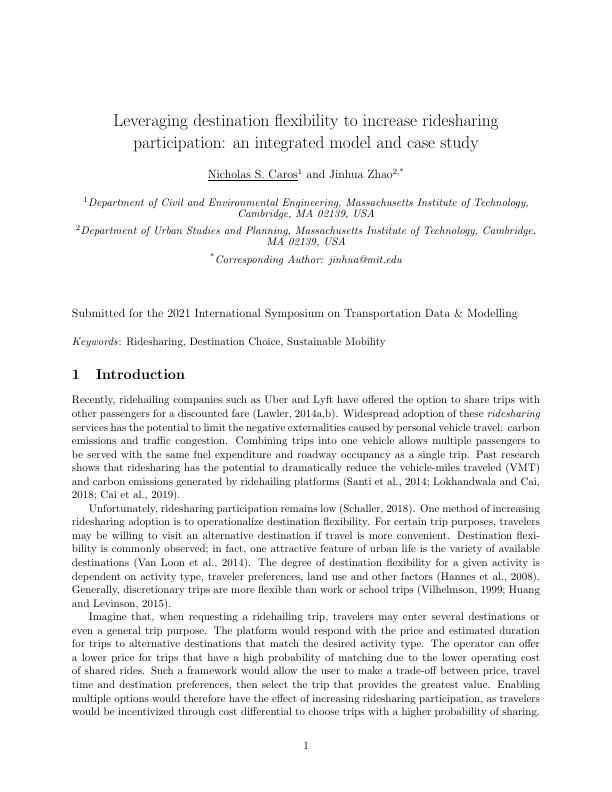Conference Sessions
M‑1: Regular Session/Behavior and Demand — Abolfazl (Kouros) Mohammadian
Submission: Complexity of Travel-Based Multitasking and Its Association to Latent Lifestyles
Presenter: Abolfazl (Kouros) Mohammadian
Authors: Ali Shamshiripour (UIC)*; Ehsan Rahimi (UIC); Abolfazl (Kouros) Mohammadian (UIC); Joshua Auld (Argonne National Laboratory )
M‑3: Regular Session/Implication of Automated Vehicles — Zhaocai Liu
Submission: Network User Equilibrium Problems with Infrastructure-Enabled Autonomy
Presenter: Zhaocai Liu
Authors: Zhaocai Liu (USU); Zhibin Chen (NYU Shanghai); Yi He (USU); Ziqi Song (USU)*
M‑2: Regular Session/Emerging Mobility — Bangyang Wei
Submission: Temporal Capacity Allocation and Tolling Schemes for Morning Commute with Carpooling
Presenter: Bangyang Wei
Authors: Bangyang Wei (University of New South Wales); Wei Liu (University of New South Wales)*; meead saberi (University of New South Wales); Fangni Zhang (UNSW Sydney); Travis Waller (University of New South Wales)
M‑4: Regular Session/Traffic Control and Management — Qiong Tian
Submission: Traffic Light Control Strategy Based on Macroscopic Fundamental Diagram
Presenter: Qiong Tian
Authors: Qiong Tian (Beihang University)*
M‑1: Regular Session/Behavior and Demand — Wataru Nakanishi
Submission: Application of Eigenvector Spatial Filtering to Travel Destination Choice Model: A Case Study of Municipality-Size Choice in Hokkaido Island, Japan
Presenter: Wataru Nakanishi
Authors: Wataru Nakanishi (Tokyo Institute of Technology)*; Hiromichi Yamaguchi (Kanazawa University)
M‑3: Regular Session/Implication of Automated Vehicles — Carol Flannagan
Submission: Urban Taxi vs Non-taxi Crashes: Implications for Automated Vehicles in the Rideshare Environment
Presenter: Carol Flannagan
Authors: Aditi Misra (University of Michigan)*; Andrew Leslie (University of Michigan); Carol Flannagan (University of Michigan, Transport Research Institute)
M‑2: Regular Session/Emerging Mobility — Zhengfei Zheng
Submission: The Critical Passenger Mass for Achieving a Societally Beneficial Ride-Splitting Program
Presenter: Zhengfei Zheng
Authors: Jintao Ke (Hong Kong University of Science and Technology)*; Hai Yang (Hong Kong University of Science and Technology); Zhengfei Zheng (Hong Kong University of Science and Technology)
M‑4: Regular Session/Traffic Control and Management — Monika Filipovska
Submission: A Priori and Adaptive Reliable Routing in Stochastic Dynamic Networks with Correlations
Presenter: Monika Filipovska
Authors: Monika Filipovska (Northwestern University); Hani S. Mahmassani (Northwestern University)*
Break
Break
Keynote Session 2 — Hani Mahmassani
Title: Operational Strategies for Urban Air Mobility and 4D System Fundamental Diagrams
Speaker: Hani Mahmassani
Abstract: We take urban mobility to the next level by considering shared mobility services offered through automated electric vertical take-off and landing (eVTOL) vehicles (“flying taxis”), enabled by new generation of eVTOL aircraft. We present various concepts for service operations at urban/regional levels, along with algorithms adapted for the real-time operation of shared air mobility fleets. We also examine the congestability of urban air space through a microscopic simulation and illustrate the emergence of system fundamental diagram (for properly defined averages taken over four-dimensional space) comparable in shape to urban road traffic networks.
Keynote Session 3 — Nikolas Geroliminis
Title: On the Inefficiency and Management of Ride-Sourcing Services towards Urban Congestion
Speaker: Nikolas Geroliminis
Abstract: Human mobility in congested city centers is a complex dynamical system with high density of population, many transport modes to compete for limited available space and many operators that try to efficiently manage different parts of this system. New emerging modes of transportation, such as ride-hailing and on-demand services create additional opportunities, but also more complexity. Little is known about to what degree its operations can interfere in traffic conditions, while replacing other transportation modes, or when a large number of idle vehicles is cruising for passengers. We experimentally analyze the efficiency of TNCs using taxi trip data from a Chinese megacity and an agent-based simulation with a trip-based MFD model for determining the speed. We investigate the effect of expanding fleet sizes for TNCs, passengers’ inclination towards sharing rides, and strategies to alleviate urban congestion. We observe that, although a larger fleet size reduces waiting time, it also intensifies congestion, which, in turn, prolongs the total travel time. Such congestion effect is so significant that it is nearly insensitive to passengers’ willingness to share and flexible supply. Finally, parking management strategies can prevent idle vehicles from cruising without assigned passengers, mitigating the negative impacts of ride-sourcing over congestion, and improving the service quality. We are also developing different type of control strategies, such as relocation of empty vehicles, parking management and pricing incentives to alleviate the negative effects.
Break
Break
T‑4: Regular Session/Behavior — Mingyou Ma
Submission: Quantifying Day-to-Day Evolution of Choice Patterns in Public Transit System with Smart Transit Card Data
Presenter: Mingyou Ma
Authors: Mingyou Ma (UNSW Sydney)*; Wei Liu (University of New South Wales); Xinwei Li (Beihang University); Fangni Zhang (UNSW Sydney); Sisi Jian (); Vinayak Dixit (UNSW)
T‑1: Regular Session/Emerging Mobility — Yingyan Lou
Submission: Congestion Mitigation for Planned Special Event: Smart Parking, Ride-Sharing Drop-off Locations and Network Configuration
Presenter: Yingyan Lou
Authors: Jun Xiao (Arizona State University); Yingyan Lou (Arizona State University)*
T‑2: Regular Session/Freight — Tanvir Ahamed
Submission: Deep Reinforcement Learning for Crowdsourced Urban Delivery: System States Characterization, Heuristics-guided Action Choice, and Rule-Interposing Integration
Presenter: Tanvir Ahamed
Authors: Tanvir Ahamed (University of Illinois at Chicago); Bo Zou (University of Illinois at Chicago)*; Nahid Farazi (University of Illinois at Chicago); Theja Tulabandhula (UIC)
T‑3: Regular Session/Data — Zijian Hu
Submission: Self-Calibration of Traffic Surveillance Camera Systems for Traffic Density Estimation on Urban Roads
Presenter: Zijian Hu
Authors: Zijian Hu (The Hong Kong Polytechnic University); Wei Ma (The Hong Kong Polytechnic University)*; William Lam (The Hong Kong Polytechnic University); S. C. Wong (The University of Hong Kong); Andy Chow (City University of Hong Kong)
T‑6: Lightning Session/Traffic Operations — Zhanguo Song
Submission: Short-Term Traffic Flow Uncertainty Prediction Using an Improved Grey Prediction Model under Different Time Intervals
Presenter: Zhanguo Song
Authors: ZHanguo Song (Southeast University)*; Xiao Qin (University of Wisconsin-Milwaukee)
T‑6: Lightning Session/Traffic Operations — Rongsheng Chen
Submission: Traffic Assignment Analysis of Traffic Networks with Max-Pressure Control
Presenter: Rongsheng Chen
Authors: Rongsheng Chen (University of Minnesota)*; Michael W. Levin (University of Minnesota)
T‑6: Lightning Session/Traffic Operations — Rui Okuhara
Submission: Effect of Traffic Accident on Arterial Road Network
Presenter: Rui Okuhara
Authors: Rui Okuhara (Ehime Univercity)*; Toshio Yoshii (Ehime University); Takahiro Tsubota (Ehime university); Hirotoshi Shirayanagi (Ehime University)
T‑6: Lightning Session/Traffic Operations — Md Abu Sayed
Submission: Predict Short-Term Traffic Flow with Prediction Error from Traffic Sensor Data Using Deep Learning
Presenter: Md Abu Sayed
Authors: Md Abu Sayed (University of Wisconsin-Milwaukee)*; Xiao Qin (University of Wisconsin-Milwaukee)
T‑6: Lightning Session/Traffic Operations — Monika Filipovska
Submission: Computation and Estimation of Path Travel Time Variability with Sparse Vehicle Trajectory Data
Presenter: Monika Filipovska
Authors: Monika Filipovska (Northwestern University); Hani S. Mahmassani (Northwestern University)*
T‑5: Lightning Session/Emerging Mobility — Qianwen Li
Submission: Autonomous Vehicle Identification Based on Car-Following Data
Presenter: Qianwen Li
Authors: Qianwen Li (University of South Florida)*; Xiaopeng Li (University of South Florida); Handong Yao (University of South Florid)
T‑5: Lightning Session/Emerging Mobility — Aurore Sallard
Submission: Modeling Ride-Hailing Use in Megacities: Evidence from São Paulo
Presenter: Aurore Sallard
Authors: Aurore Sallard (IVT, ETHZ)*; Milos Balac (IVT, ETHZ); Kay W. Axhausen (IVT, ETH)
T‑5: Lightning Session/Emerging Mobility — Huimin Yan
Submission: Coordinated Space-Time Trajectory Planning and Cyclic Control in Automated Vehicle Zones
Presenter: Huimin Yan
Authors: Huimin Yan (Tsinghua University)*
T‑5: Lightning Session/Emerging Mobility — Rafaqat Ali
Submission: A Multimodal Traveling Itinerary Problem in a Time Dependent Multimodal Transportation Network for a Fixed Sequence of Nodes with Time Windows
Presenter: Rafaqat Ali
Authors: Rafaqat Ali (Tsinghua University)*
T‑5: Lightning Session/Emerging Mobility — Evangelos Mintsis
Submission: Management of Connected and Automated Vehicle Disengagements in the proximity of Work Zones
Presenter: Evangelos Mintsis
Authors: Evangelos Mintsis (Hellenic Institute of Transport (HIT))*
T‑6: Lightning Session/Traffic Operations — Lukas Vacek
Submission: Discontinuous Galerkin Method for Macroscopic Traffic Flow Models on Networks using Numerical Fluxes at Junctions
Presenter: Lukas Vacek
Authors: Lukáš Vacek (Charles University)*; Václav Kučera (Charles University)
T‑4: Regular Session/Behavior — Hebert Azevedo-Sa
Submission: Using Trust in Automation to Enhance Driver-(Semi)AutonomousVehicle Interaction and Improve Team Performance
Presenter: Hebert Azevedo-Sa
Authors: Hebert Azevedo Sa (University of Michigan)*
T‑1: Regular Session/Emerging Mobility — Amirmahdi Tafreshian
Submission: Proactive Vehicle Dispatching in Large-Scale Ride-Sourcing Systems
Presenter: Amirmahdi Tafreshian
Authors: Amirmahdi Tafreshian (University of Michigan)*; Mojtaba Abdolmaleki (University of Michigan); Neda Masoud (University of Michigan); Huizhu Wang (Ford Motor Company)
T‑2: Regular Session/Freight — Sudheer Ballare
Submission: A Many-to-Many Vehicle Routing Problem with Split Loads
Presenter: Sudheer Ballare
Authors: Jane Lin (University of Illinois at Chicago)*; Sudheer Ballare (University of Illinois at Chicago)
T‑3: Regular Session/Data — Ang Li
Submission: Within-Day Prediction of Path Travel Times with Use of Multi-Source of Traffic Data
Presenter: Ang Li
Authors: Ang Li (The Hong Kong Polytechnic University)*; William Lam (The Hong Kong Polytechnic University); Renxin Zhong (Sun Yat-sen University)
T‑4: Regular Session/Behavior — Ragavendran Gopalakrishnan
Submission: Behavioral Models of Users in Ride-Sharing
Presenter: Ragavendran Gopalakrishnan
Authors: Theja Tulabandula (University of Illinois at Chicago)*; Ragavendran Gopalakrishnan (Queens University)
T‑1: Regular Session/Emerging Mobility — Kenan Zhang
Submission: A General Spatiotemporal Equilibrium Model of Ride-Hail Market
Presenter: Kenan Zhang
Authors: Yu (Marco) Nie (Northwestern University)*; Kenan Zhang (Northwestern University)
T‑2: Regular Session/Freight — Mausam Duggal
Submission: Unknown to Known: Predicting Truck GPS Commodity Using Machine Learning
Presenter: Mausam Duggal
Authors: Mausam Duggal (WSP); Bryce W Sharman (WSP)*; Rick Donnelly (WSP); Matthew Roorda (University of Toronto); Sundar Damodaran (Ministry of Transportation of Ontario); Shan Sureshan (Ministry of Transportation of Ontario)
T‑3: Regular Session/Data — Di Yang
Submission: Exploring the Possibility of Outlier Detection Using Functional Data Analysis for Proactive Safety Management
Presenter: Di Yang
Authors: Di Yang (New York University)*; Kaan Ozbay (New York University); Kun Xie (Old Dominion University); Hong Yang (Old Dominion University); Fan Zuo (New York University); Di Sha (New York University)
T‑4: Regular Session/Behavior — Zhengtian Xu
Submission: Understanding Ride-Sourcing Drivers’ Customer-Search Behavior
Presenter: Zhengtian Xu
Authors: Junji Urata (University of Michigan)*; Jintao Ke (Hong Kong University of Science and Technology); Zhengtian Xu (University of Michigan); Guojun Wu (Worcester Polytechnic Institute); Yafeng Yin (University of Michigan); Hai Yang (Hong Kong University of Science and Technology); Jieping Ye (Didi Chuxing)
T‑1: Regular Session/Emerging Mobility — Min Xu
Submission: Addressing the Fleet Sizing Problem for Shared-and-Autonomous-Mobility Services
Presenter: Min Xu
Authors: Min Xu (The Hong Kong Polytechnic University)*
T‑2: Regular Session/Freight — Guoqing Zhang
Submission: An Integrated Location-Inventory Model for the Healthcare Supply Network under Stochastic Demands
Presenter: Guoqing Zhang
Authors: Guoqing Zhang (University of Windsor)*; Mohammed Almanaseer (University of Windsor); Xiaoting Shang (University of Windsor)
T‑3: Regular Session/Data — Xiangyang Guan
Submission: Correcting Biases in Using Emerging Big Data for Mobility Research: A Likelihood-Based Approach
Presenter: Xiangyang Guan
Authors: Xiangyang Guan (University of Washington)*; Cynthia Chen (University of Washington); Shuai Huang (University of Washington)
Break
Break
Keynote Session 4 — Alexandre Bayen
Title: Lagrangian Control at Large and Local Scales in Mixed Autonomy Traffic Flow
Speaker: Alexandre Bayen
Abstract: This talk investigates Lagrangian (mobile) control of traffic flow at local scale (vehicular level). The question of how self-driving vehicles will change traffic flow patterns is investigated. We describe approaches based on deep reinforcement learning presented in the context of enabling mixed-autonomy mobility. The talk explores the gradual and complex integration of automated vehicles into the existing traffic system. We present the potential impact of a small fraction of automated vehicles on low-level traffic flow dynamics, using novel techniques in model-free deep reinforcement learning, in which the automated vehicles act as mobile (Lagrangian) controllers to traffic flow. Illustrative examples will be presented in the context of a new open-source computational platform called FLOW, which integrates state of the art microsimulation tools with deep-RL libraries on AWS EC2. Interesting behavior of mixed autonomy traffic will be revealed in the context of emergent behavior of traffic: https://flow-project.github.io/
Keynote Session 5 — Henry Liu
Title: Intelligent Driving Intelligence Test for Autonomous Vehicles with Naturalistic and Adversarial Driving Environment
Speaker: Henry Liu
Abstract: Driving intelligence tests are critical to the development and deployment of autonomous vehicles. The prevailing approach tests autonomous vehicles in life-like simulations of the naturalistic driving environment. However, due to the high dimensionality of the environment and the rareness of safety-critical events, hundreds of millions of miles would be required to demonstrate the safety performance of autonomous vehicles, which is severely inefficient. We discover that sparse but adversarial adjustments to the naturalistic driving environment, resulting in the naturalistic and adversarial driving environment, can significantly reduce the required test miles without loss of evaluation unbiasedness. By training the background vehicles to learn when to execute what adversarial maneuver, the proposed environment becomes an intelligent environment for driving intelligence testing. We demonstrate the effectiveness of the proposed environment in a highway-driving simulation. Comparing with the naturalistic driving environment, the proposed environment can accelerate the evaluation process by multiple orders of magnitude.
Break
Break
W‑1: Regular Session/Connected and Automated Vehicles — Yingyan Lou
Submission: How Small Can Headways Be in Platoons of Connected Autonomous Vehicles?
Presenter: Yingyan Lou
Authors: Yingyan Lou (Arizona State University)*
W‑2: Regular Session/Traffic Operations — David Hale
Submission: A Methodology for Trajectory-Based Calibration of Microsimulation Models
Presenter: David Hale
Authors: David K. Hale (Leidos, Inc.)*; Xiaopeng Li (University of South Florida); Amir Ghiasi (Leidos, Inc.); Dongfang Zhao (University of South Florida)
W‑3: Regular Session/Data-Informed Decision Making — Shogo Umeda
Submission: Risk Evaluation of Anomaly Event Occurrence Using Probe Vehicle Data
Presenter: Shogo Umeda
Authors: Shogo Umeda (Tohoku University)*; Yosuke Kawasaki (Tohoku University); Masao Kuwahara (Tohoku University)
W‑4: Regular Session/Shared Mobility — Jintao Ke
Submission: Online Optimization and Offline Learning for On-Demand Matching in Ride-Sourcing Services
Presenter: Jintao Ke
Authors: Xiaoran Qin (Hong Kong University of Science and Technology); Jintao Ke (Hong Kong University of Science and Technology)*; Wei Liu (University of New South Wales); Hai Yang (Hong Kong University of Science and Technology)
W‑6: Lightning Session/Modeling, Simulation and Optimization — Md Mintu Miah
Submission: Challenges and Opportunities of Emerging Data Sources to Estimate Network-Wide Bike Counts
Presenter: Md Mintu Miah
Authors: Md Mintu Miah (University of Texas At Arlington)*
W‑6: Lightning Session/Modeling, Simulation and Optimization — Ahmed Alshurafa
Submission: Exploring and Modeling Truck Tours and Their Associated Stop Locations: Towards a Micro-Simulation Approach
Presenter: Ahmed Alshurafa
Authors: Ahmed A. R. Alshurafa (University of Windsor)*
W‑6: Lightning Session/Modeling, Simulation and Optimization — Zhixiong Luo
Submission: Joint Deployment of Low Emission Zones and Electric Vehicle Charging Stations
Presenter: Zhixiong Luo
Authors: Zhixiong Luo (Tsinghua University)*; Fang He (Tsinghua University); Xi Lin (Tsinghua University); Meng Li (Tsinghua University)
W‑6: Lightning Session/Modeling, Simulation and Optimization — Yi Guo
Submission: Signalized Corridor Management with Trajectory Prediction and Optimization under Mixed-Autonomy Traffic Environment
Presenter: Yi Guo
Authors: Yi Guo (University of Cincinnati); Jiaqi Ma (University of California, Los Angeles)*
W‑6: Lightning Session/Modeling, Simulation and Optimization — Mohammad Miralinaghi
Submission: On the Optimization of Electric Charging Infrastructure to Address Vehicular Emissions
Presenter: Mohammad Miralinaghi
Authors: Mohammad Miralinaghi (Purdue University)*; Goncalo Correia (TU Delft); Sania Esmaeilzadeh Seilabi (Purdue University); Mahmood T. Tabesh (Purdue University); Samuel Labi (Purdue University)
W‑5: Lightning Session/Behavior — Hui Shen
Submission: Travel Mode Choice of Young People with Differentiated E‑Hailing Ride Services: A Case Study in Nanjing China
Presenter: Hui Shen
Authors: Hui Shen (University of Illinois at Chicago); Bo Zou (University of Illinois at Chicago); Jane Lin (University of Illinois at Chicago)*
W‑5: Lightning Session/Behavior — Jingxing Wang
Submission: Neighborhood Level Impacts in Human Travel Patterns: Findings from the Closure of Alaskan Way Viaduct
Presenter: Jingxing Wang
Authors: Jingxing Wang (University of Washington)*; Xuegang Ban (University of Washington); He Zhu (University of Washington)
W‑5: Lightning Session/Behavior — Ehsan Rahimi
Submission: Analyzing the Usage Frequency of Shared E‑Scooters During the COVID-19 Pandemic
Presenter: Ehsan Rahimi
Authors: Ali Shamshiripour (UIC)*; Ehsan Rahimi (UIC); Ramin Shabanpour (UIC); Abolfazl (Kouros) Mohammadian (UIC)
W‑5: Lightning Session/Behavior — Xiangyang Guan
Submission: A Novel State-Transition Model for Real-Time Forecasting of Evacuation Demand
Presenter: Xiangyang Guan
Authors: Xiangyang Guan (University of Washington)*; Cynthia Chen (University of Washington)
W‑5: Lightning Session/Behavior — Bartosz Bursa
Submission: Modelling Tourist On-Site Mode Choice Decisions during Vacation Stays
Presenter: Bartosz Bursa
Authors: Bartosz Bursa (University of Innsbruck)*; Markus Mailer (University of Innsbruck)
W‑1: Regular Session/Connected and Automated Vehicles — Tamas Molnar
Submission: On-Board Traffic Prediction Via V2X Connectivity
Presenter: Tamas Molnar
Authors: Tamas G. Molnar (University of Michigan)*; Devesh Upadhyay (Ford Motor Co.); Michael Hopka (Ford Motor Co.); Michiel Van Nieuwstadt (Ford Motor Co.); Gabor Orosz (University of Michigan)
W‑2: Regular Session/Traffic Operations — Ali Zockaie
Submission: Investigating Weather Impacts on Network-Wide Traffic Flow Relationships
Presenter: Ali Zockaie
Authors: Ramin Saedi (Michigan State University); Ali Zockaie (Michigan State University)*
W‑3: Regular Session/Data-Informed Decision Making — Jiqian Dong
Submission: Lane-Change Decisions of Connected Autonomous Vehicles Using Spatially-Weighted Information and Deep Reinforcement Learning
Presenter: Jiqian Dong
Authors: Jiqian Dong (Purdue University); Sikai Chen (Purdue University)*; Paul (Young Joun) Ha (Purdue University); Runjia Du (Purdue University); Yujie Li (Southeast University); Samuel Labi (Purdue University)
W‑4: Regular Session/Shared Mobility — Ester Lorente
Submission: An Agent-based Simulation Model for Intermodal Assignment of Public Transport and Ride Pooling Services
Presenter: Ester Lorente
Authors: Ester Lorente (PTV Group)*; Jaime Barcelo (Tech. Univ. of Catalunya); Esteve Codina (Universitat Politècnica de Catalunya); Klaus Nökel (PTV Group)
W‑1: Regular Session/Connected and Automated Vehicles — Xiaopeng Li
Submission: Vehicle Trajectory Optimization at a Signalized Intersection in Mixed Traffic: Model and Field Experiments
Presenter: Xiaopeng Li
Authors: Zhen Wang (Chang'an Univeristy)*; Xiaopeng Li (University of South Florida); Xiangmo Zhao (Changan University); Zhigang Xu (Chang'an University)
W‑2: Regular Session/Traffic Operations — Daniel Bramich
Submission: FitFun: Improved noise models for Fundamental Diagrams
Presenter: Daniel Bramich
Authors: Dan Bramich (New York University Abu Dhabi)*; Monica Menendez (New York University Abu Dhabi); Lukas Ambuhl (ETH Zurich)
W‑3: Regular Session/Data-Informed Decision Making — Matthew Daus
Submission: Big Data Transportation Data Access & Privacy in a Multi-Modal Autonomous & Connected World
Presenter: Matthew Daus
Authors: Matthew W. Daus (CCNY/UTRC)*
W‑4: Regular Session/Shared Mobility — Xiaolin Cai
Submission: Modeling and Simulation of Potential Use-Cases for Shared Mobility Services in the City of Ann Arbor
Presenter: Xiaolin Cai
Authors: Richard Twumasi-Boakye (Ford Motor Company)*; Xiaolin Cai (Ford Motor Company); James Fishelson (Ford Motor Company)
W‑1: Regular Session/Connected and Automated Vehicles — Jiaqi Ma
Submission: DTEM: Dynamic Traffic Environment Mapping for Connected and Automated Traffic Control
Presenter: Jiaqi Ma
Authors: Tao Li (University of Cincinnati); Jiaqi Ma (University of California, Los Angeles)*
W‑3: Regular Session/Data-Informed Decision Making — Yiyang Wang
Submission: Real-Time Sensor Anomaly Detection and Recovery in Connected Automated Vehicle Sensors
Presenter: Yiyang Wang
Authors: Yiyang Wang (University of Michigan)*; Neda Masoud (University of Michigan); Anahita Khojandi (University of Tennessee)
W‑4: Regular Session/Shared Mobility — Nicholas Caros
Submission: Leveraging Destination Flexibility to Increase Ridesharing Participation: An Integrated Model and Case Study
Presenter: Nicholas Caros
Authors: Nicholas Caros (MIT); Jinhua Zhao (MIT)*
Break
Break
Keynote Session 6 — Fengmin Gong
Title: Better Journeys For All Through Impact, Innovation & Responsibility
Speaker: Fengmin Gong
Abstract: Data science and AI are at the core of the “fourth industrial resolution”. While the science and technology community are diligently pushing the frontier for the benefits of humanity, some fear the negative impact of the same. The crust of the matter is that, Data science and AI are powerful tools with huge potential, HOW we harness this power is the most critical factor to success or disaster. In this talk, I will share three main guiding principles — impact, innovation, and responsibility, which should help us to do the right things the right way in applying AI. DiDi has been at the forefront in transforming transportation through AI. To illustrate these principles, I will use some examples in reinforcement learning for optimization, NLP for safe rides, and use-case driven simulation for AV.
